ジーン・ウェブスターが3年生までのヴァッサー大学の学年暦 Vassar College Calendars, 1987-1890 [Marginalia 余白に]
参照可能なヴァッサー女子大学のカタログ(1897-98版と1898-99版)の記述をまとめてメモ的に書き写し、貼り付けておきます、とりあえず。
まず、下のは前に貼ったページです。
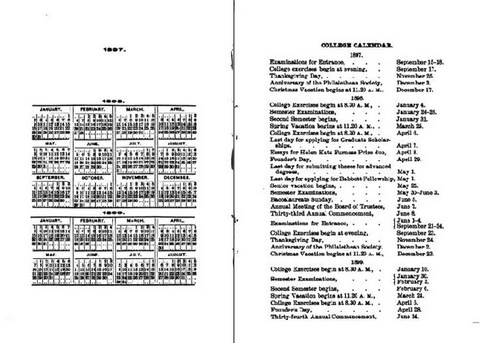
Thirty-Third Annual Catalogue of the Officers and Students of Vassar College, Poughkeepsie, N. Y.: 1897-98 (Poughkeepsie: A. V. Haight, 1897), pp. 4-5 <http://www.archive.org/stream/annualcatalogue00collgoog#page/n647/mode/2up>
以下、なんとなく日付と事柄を左右ひっくり返して3年分記します。
1897.
September 15-18. Examinations for Entrance
September 17. College exercises begin at evening
November 25. Thanksgiving Day
December 3. Anniversary of the Philalethean Society
December 17. Christmas Vacation begins at 11.20 a. m.
1898.
January 4. College Exercises begin at 8.30 a. m.
January 24-28. Semester Examinations
January 31. Second Semester begins
March 25. Spring Vacation begins at 11.20 a. m.
April 6. College Exercises begin at 8.30 a. m.
April 7. Last day for applying for Graduate Scholarships
April 8. Essays for Helen Kate Furness Prize due
April 29. Founder's Day
May 1. Last day for submitting theses for advanced degrees
May 1. Last day for applying for Babbott Fellowship
May 25. Senior vacation begins
May 30-June 3. Semester Examinations
June 5. Baccalaureate Sunday
June 7. Annual Meeting of the Board of Trustees
June 8. Thirty-third Annual Commencement
June 1-4;
September 21-24. Examinations for Entrance
September 23. College Exercises begin at evening
November 24. Thanksgiving Day
December 2. Anniversary of the Philalethean Society
December 23. Christmas Vacation begins at 11.20 a. m.,
1899.
January 10. College Exercises begin at 8.30 a. m.
January 30-
February 3. Semester Examinations
February 6. Second Semester begins
March 24. Spring Vacation begins at 11.20 a. m.
April 5. College Exercises begin at 8.30 a. m.
April 6. Last day for applying for Graduate Scholarship
April 7. Essays for Helen Kate Furness Prize due
April 28. Founder's Day
May 1. Last day for submitting theses for advanced degrees
May 1. Last day for applying for Babbott Fellowship
May 31. Senior vacation begins
June 5-9. Semester Examinations
June 11. Baccalaureate Sunday
June 13. Annual Meeting of the Board of Trustees
June 14. Thirty-fourth Annual Commencement
June 7-10;
September 20-23. Examinations for Entrance
September 22. College Exercises begin at evening
November 23. Thanksgiving Day
December 1. Anniversary of the Philalethean Society
December 22. Christmas Vacation begins at 11.20 a. m.
1900.
January 9. College Exercises begin at 8.30 a. m.
January 29-
February 2. Semester Examinations
February 5. Second Semester begins
March 23. Spring Vacation begins at 11.20 a. m.
April 4. College Exercises begin at 8.30 a. m.
April 27. Founder's Day
June 13. Thirty-fifth Annual Commencement
とりあえずひとつだけ。クリスマス休暇の始まりというのは、毎年金曜日だというのはわかります。これはカリフォルニアにいるときに書いた「December 12 ロケッツのクリスマス・ショーをホールデン・コールフィールドは期待していなかったっていえるのかい Had Not Holden Colefield Expected to Watch the Rockettes Christmas Pageant」で、モーリちゃんの通っていた学校の休みが土曜日からということから、「アメリカの学校は金曜日までやってから休みに入る」のかと推測したように、年毎に曜日にあわせて日が変わるのだと思われ。その帳尻は一月の始業日を前後させて調整するようです。それにしても、「午前11時20分より」クリスマス休暇が始まる、と細かく書くところがヴァッサー的。逆に金曜の午前11時20分まではまだ冬休みじゃないのですね。あー、それとも、アルバニーの小学校も、金曜に学校へ行って、その日の課目等が終わるとその日に休暇に入る、という約束なのかしら。
名前の訂正――ジェーンとジーン Change of Name: Jane and Jean [作家の肖像]
記事「ヴァッサー女子大1897年度新入生名簿 1897-98 Freshman Class of Vassar Female College」で、ジーン・ウェブスターは "Webster, Alice Jean Chandler" と本名で記載されていると書きましたが、それはAlice というファーストネームとチャンドラーというミドルネームも載っているのでついそう勘違いしたことに気づきました。本名はAlice Jane Chandelr Webster です。
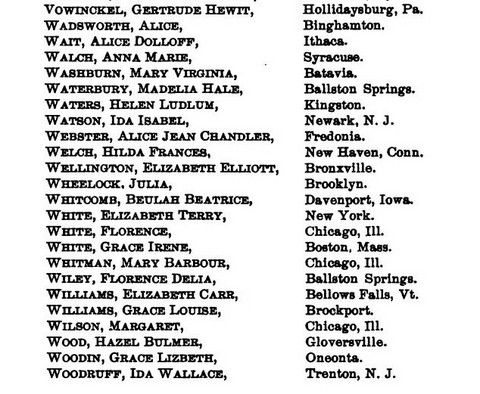
Thirty-Third Annual Catalogue of the Officers and Students of Vassar College, Poughkeepsie, N. Y.: 1897-98 (Poughkeepsie: A. V. Haight, November 1897), p. 95 <http://www.archive.org/stream/annualcatalogue00collgoog#page/n647/mode/2up>
ジェーンをジーンに変えた事情については、日本語の『あしながおじさん』の訳書の解説等がこぞって書いている有名な話があり、それは自分も「ジェインとジーン Lady Jane and Jean Webster」で、さらなる勝手な推測とともに書きました。――
ウェブスターがこの前の記事「レイディー・ジェイン・グレイ・スクール Lady Jane Grey School」で書いたレイディー・ジェイン・グレイ・スクールというフィニッシング・スクールに、ヴァッサー女子大の前に入学したときに、同室にアリスという女子学生がいて、ウェブスターは大学当局(だか寮長だかわかりませんが)からミドル・ネームを用いるように求められます。しかし(ウェブスターには)Jane は "old-fashioned" に思われたために、それをJean に変えて、その後もそれで(つまり Jean Websterで)通すようになったといわれています。
自分が典拠としたのは、少なくとも初期の邦訳者たちが参照したらしい、カヴァーの絵からして1930年代以降の、Grosset 社のリプリント版に付された無署名の "Introduction" です――Jean Webster, Daddy-Long-Legs (New York: Grosset and Dunlap, Thrushwood Book, 1940[?]) <http://www.archive.org/details/daddylonglegs00webs>。(ちなみに、この序文は、「『あしながおじさん』 Asa の謎 Asa Mystery」で書いたように、やはり初期の邦訳者たちがウェブスターの著作リストに入れている謎の "Asa" という作品を記載した記事でもありました。)
Jean Webster's real name was Alice Jane Chandler Webster, the Jane being after Mark Twain's mother. When she went to college, her room-mate's name was also Alice, so Miss Webster was asked to take her second name. But since to her Jane seemed a little old-fashioned, she changed it to Jean and ever after went by that name. (12)
読んだときには、ちょうど『あしながおじさん』で Jerusha ジェルーシャが Judy ジュ(ー)ディーに名を変えたように、呼び名として「ジーン」となったのかと思っていました(catalogue 以外の場所ではJudy です、とジュディーは書いていました)。しかし、どうやら、(それとともに)Alice Jane Chandler Webster が Alice Jean Chandler Webster になったのですね(つまり、アリスやチャンドラーは残ったまま)。
どうも話にちょっとひねりというかねじれがあるような気がまたしてきました。
もっともジェイン・グレイ・スクールではあくまで呼び名としてだけだったのかもしれませんが。
ともかく、ヴァッサーに入ったときには、氏名を正式に Alice Jean Chander Webster としていたらしいことがうかがえます。思えば、Jane と Jean は(むろん後者は前者のvariant ですけれど)音が似ているだけでなく、ane が ean へ並び替わっただけで文字は同じですし、手書きの文書だったら気が付かずに見逃されてしまいそうな変更です(特にアメリカではw)。
2年生のときも、やっぱり Alice Jean Chandler Webster でした(あたりまえ)。
Thirty-Fourth Annual Catalogue of the Officers and Students of Vassar College, Poughkeepsie, N. Y.: 1898-99 (Poughkeepsie: A. V. Haight, December 1898), p. 90 <http://www.archive.org/stream/annualcatalogue00collgoog#page/n839/mode/1up> 〔この年は12月付で刊行されていました〕
しかし・・・・・・人数減ってますねー。新たにリストに入ったSusan Wightman さんのような人もいますけれど。頭文字Wの姓の人が23人から17人になっています。
デートと万年カレンダーによるジュディーの誕生日の推定はほんとにあっていたのか? Was the Supposition of Judy's Birthday from Dates and the Perpetual Calendar True [Daddy-Long-Legs]
ヴァッサー女子大学の『要覧 Catalogue』に掲載されている「学年暦 Calendar」を眺めながら、作家のジーン・ウェブスターはこのカレンダーを眺めながら『あしながおじさん』を書いたのかしら、などとぼんやり考えていたのですが、ふと暗い疑念がもたげてきて、調べたところ、過去の記事を訂正する必要が生じました。
8月末の記事「デートと万年カレンダー――ジュディーの誕生日 Dates and the Perpetual Calendar: Judy's Birthday」で、『あしながおじさん』の作品中で一箇所だけ日付と曜日の組み合わせが特定される、4年生の3月5日の手紙(手紙の冒頭で、明日が3月最初の水曜日だとジュディーはいう)から、4年生のカレンダーが何年だったのかを推定しました。以下が推定と結論の部分です――
ふと、思いついたように、ジーン・ウェブスターが卒業した1901年を調べてみます(この年のカレンダーは1878年、1889年、1895年、1907年、1918年、1929年、1935年、1946年、1957年などと同一です)――(1) [The Perfect Perpetual Calendar ] <http://www5a.biglobe.ne.jp/~accent/calendar/F.htm>。
Sunday Monday Tuesday Wednesday Thursday Friday Saturday __ __ __ __ __ 1 2 3 4 5 6 7 8 9 10 11 12 13 14 15 16 17 18 19 20 21 22 23 24 25 26 27 28 29 30 31 ビンゴ♪ 1901年の3月5日は火曜日、翌6日は月の第一水曜日でした。
そこで1年前の3年生の11月を確認します。
1900年11月の暦
Sun Mon Tue Wed Thu Fri Sat __ __ __ __ __ __ 1 2 3 4 5 6 7 8 9 10 11 12 13 14 15 16 17 18 19 20 21 22 23 24 25 26 27 28 29 30
ジュディーが、「私先週21になりました」と書いた11月9日は、作者ジーン・ウェブスターがカレンダーに忠実であったならば、日曜日でした。そうすると、単純には11月2日から8日まで。そして昨日や一昨日を「先週」とはふつうは呼ばないでしょうから(わかりませんが、日本人の感覚ではそうでしょう)、11月2日~6日までのあいだにしぼられるのではないでしょうか。
この推論は基本的に間違ってはいないと思うのですけれど、万年カレンダーが教える、(ウェブスターの卒業した1901年の暦は)「1878年、1889年、1895年、1907年、1918年、1929年、1935年、1946年、1957年などと同一」という情報につい目が曇って別の可能性に目が行かなかったのです。
それは1912年、すなわち、10月に『あしながおじさん』の初版がニューヨークのセンチュリー出版社から刊行される年のカレンダーです。下のは、Perpetual Calendar の日本語版というか、「あの日は何曜日? 10000年カレンダー」(「万年」じゃなくて「10000年」なんですが)というサイトの情報です。――
<http://www5a.biglobe.ne.jp/~accent/kazeno/calendar/1912.htm>
1年間の日付のすべてが1901年と同じであるのではありません。閏(うるう)月2月のあとの3月から同一です。1912年の3月5日は火曜日、翌6日は月の第一水曜日なのでした。
ですから、可能性としては、ウェブスターは1912年が卒業の年だったというリアルタイムの物語として『あしながおじさん』の時間を設定していたかもしれないのです。もちろん、その裏側で、自身のヴァッサー在学時のカレンダーと重ねていた可能性もありますけれど。 時代設定ということでいえば、スカートの長さから考えると、自身が大学生だった頃ではなくて、たかだか15~11年位かもしれませんけれど20世紀の1910年代のナウい丈にしているのではなかろうかと思われ〔スカート丈については「ジュディーとパティーのスカート丈 Skirt Length」参照〕。
1912年がオリンピックの開かれるうるう年であること、そして、ついでに言えば、1900年がオリンピックが開かれるけれど100年に1回の非うるう年だったことによって、カレンダーが乱れるとともにモーリちゃんの父の頭も乱れていたようなのでした。
なお、3年生の11月のカレンダーはつぎのようにだいぶズレていますです。――
1911年11月の暦
| Sun | Mon | Tue | Wed | Thu | Fri | Sat |
| __ | __ | __ | 1 |
2 |
3 |
4 |
| 5 |
6 |
7 |
8 |
9 |
10 |
11 |
| 12 |
13 | 14 | 15 | 16 | 17 | 18 |
| 19 | 20 |
21 |
22 |
23 | 24 | 25 |
| 26 | 27 | 28 | 29 | 30 |
__ | __ |
えーと、 3年生になったジュディーが、「私先週21になりました」と書いた11月9日は、作者ジーン・ウェブスターがカレンダーに忠実であったならば、木曜日でした。しぼりなおされるジュディーの誕生日は10月30日から11月4日でしょうか。
子らよ My Chillun [Marginalia 余白に]
ある事情があって、ルイーザ・メイ・オルコットのいわゆる処女小説『気まぐれ Moods』 (初版1864; 第2版1882)をパラパラ見ていたのですが、2版の序文でオルコットが自作を「子供」と呼んでいるのが目にとまりました。そのこと自体はめずらしいことではないのですけれど、記事「ガス・ハウス Gas House」と「本葬・・・・・・本の火葬 Cremation of Books as Bodies」で『あしながおじさん』のジュディーの本の産みの親的ふるまいを書いたので、なんか気になって・・・・・・こういう気になりかたの処理(メモ etc)って、タイミングと勢いがあって、おそらくブログを書く前は、そのままほうっておいたことかもしれません。
( 『気まぐれ』が最初に出版されたときというのは、書かれてから何年か過ぎていたため、出版社の嗜好と都合にあうように改変がなされたので、その結果、物語の元々の目的が見失われ、主題として、徳義(principle)ではなく衝動に導かれた気まぐれな性質の誤りにかわって、結婚がおもてに出ていました。結婚という主題については18歳の少女はわずかしか知らず、気まぐれについてはたいていの少女が多くを知っているのです。そして、私の読者のなかで少女たちだけがこの本の真の目的を、本の多くの短所にもかかわらず見抜いて、私にそのことの礼を言ってくれてきたのでした。
少女の直観と想像力が感じ、述べようとしたものの正しさを、大人の女の観察と経験は保証してくれましたので、私は、私の最初の小説を、その欠点はそのままに、それよりは成功した妹たちのなかまに場所を与えたいと願っています。この本には、その後の本が持っていない愛と労苦と情熱がこめられていたのですから。
いくつかの章が省かれ、もともとあったいくつかの章が復元されています。そして、残ったものについては、このささやかなロマンスの若々しい精神を壊さないでできるかぎり余分な文章を切り取りました。18歳では、死はシルヴィアの難局の唯一の解決と思われました。しかし30年後、失意ののちに幸福をみいだし、愛と義務に手と手を携えさせる可能性を学び、私のヒロインは、前の版よりもロマンティックではないかもしれないけれどもより賢明な運命に向かいあうのです。
若い人たちがこの改訂を受け入れてくださることを、そして、年長のかたがたが、不運な子供をこそ最もいとおしいものとする母性本能に同情を寄せててくださることを希望して、私は、私の初生児 (first-born) を、私のその後の子供たち (off-spring) を親切に歓迎してくれた公衆に再紹介いたします。
L・M・オールコットコンコード 1882年1月)
よくわからんのが、終わりから2番目の段落の "At eighteen" と "thirty years later" のところです。この序文だけ読むと、30年前、つまり、1832年生まれで、この第2版が出た年に50歳になる作家が、30年前の10代のころの若書きの処女長篇について、自分の人生の経験とあわせて語っているように見えます。けれども、『気まぐれ』の草稿の執筆は1860年の5月に始められたということが年譜から確認されますし、書き終わった8月の日記では「4週間のあいだ日中ずっと書き、夜もほとんど一晩中考えていた」と書いています。出版は、確かに数年の間があいて、1864年暮れでした(Boston, 1865)。
18歳というのは最初の段落にも出てきて、これはヒロインSylvia について言っているのかとも思ったのですけれど、――第3章でシルヴィアは18歳だけれど、4月生まれの彼女は話のおわりのほうでは21歳になっていると思うし、いや、そもそも終わりから2番目の段落と関係しているのだとすれば、これはやっぱり作家自身のことかと。それとも作家と、ヒロインが、あるいは作品がシンクロしちゃっているのでしょうか。
謎をはらみつつ、謎解決のめどもたたぬままつづく~♪
///////////////////////////////
初版のリプリントのE-text
Louisa May Alcott, Moods (Boston: Loring, 1864)
<http://www.archive.org/details/moodslouisaalcot00alcorich>
Moods 初版 (Boston: Loring, 1864) の(リプリントの)扉絵 <http://www.archive.org/texts/flipbook/flippy.php?id=moodslouisaalcot00alcorich>
第2版のE-text
Louisa May Alcott, Moods: A Novel (Boston: Roberts Brothers, 1882)
<http://www.archive.org/details/moodsnovel00alcorich>
フランケンシュタインの産みの親――子らよのパート2 Progenitor of Frankenstein: My Chillun, Part 2 [Marginalia 余白に]
(BGM は「子らよ」です。)
昨日の記事「子らよ My Chillun」には、ビール(ほんとは発泡酒)を飲みながら適当にやっつけた訳文を付けたのですが、読み直してみると、わかりにくいところがありました。それで、ほんとうはつづきの解答は得られておらないのですけれど、とりあえず補足をして、ついでにお茶を濁しておきたいと思います。
英語の原文をちゃんと打ってみます。
PREFACE
WHEN "Moods" was first published, an interval of some years having then elapsed since it was written, it was so altered, to suit the taste and convenience of the publisher, that the original purpose of the story was lost sight of, and marriage appeared to be the theme instead of an attempt to show the mistakes of a moody nature, guided by impulse, not principle. Of the former subject a girl of eighteen could know but little, of the latter most girls know a good deal; and they alone among my readers have divined the real purpose of the book in spite of its many faults, and have thanked me for it.
As the observation and experience of the woman have confirmed much that the instinct and imagination of the girl felt and tried to describe, I wish to give my first novel, with all its imperfections on its head, a place among its more successful sisters; for into it went the love, labor, and enthusiasm that no later book can possess.
Several chapters have been omitted, several of the original ones restored; and those that remain have been pruned of as much fine writing as could be done without destroying the youthful spirit of the little romance. At eighteen death seemed the only solution for Sylvia's perplexities; but thirty years later, having learned the possibility of finding happiness after disappointment, and making love and duty go hand in hand, my heroine meets a wiser if less romantic fate than in the former edition.
Hoping that the young people will accept the amendment, and the elders will sympathize with the maternal instinct which makes unfortunate children the dearest, I reintroduce my first-born to the public which has so kindly welcomed my later off spring.
L. M. ALCOTT.
CONCORD, January, 1882.(『気まぐれ』が最初に出版されたときというのは、書かれてから何年か過ぎていたため、出版社の嗜好と都合にあうように改変がなされたので、その結果、物語の本来の目的が見失われ、主題としては、徳義(principle)ではなく衝動に導かれた気まぐれな性質の誤りという主題にかわって、結婚がおもてに出ていました。結婚という主題については18歳の少女はわずかしか知りえず、気まぐれについてはたいていの少女が多くを知っているのです。そして、私の読者のなかで少女たちだけがこの本の真の目的を、本の多くの短所にもかかわらず見抜いて、私にそのことの礼を言ってくれてきたのでした。
少女の本能と想像力が感じ、述べようとしたものの正しさを、大人の女の観察と経験は保証してくれましたので、私は、私の最初の小説を、その欠点はそのままに、それよりは成功した妹たちのなかに場所を与えたいと願っています。この本には、その後の本が持っていない愛と労苦と情熱がこめられていたのですから。
いくつかの章が省かれ、もともとあったいくつかの章が復元されています。そして、残ったものについては、このささやかなロマンスの若々しい精神を壊さないでできるかぎり余分な文章を切り取りました。18歳では、死はシルヴィアの難局の唯一の解決と思われました。しかし30年後、失意ののちに幸福をみいだし、愛と義務に手と手を携えさせる可能性を学び、私のヒロインは、前の版よりもロマンティックではないかもしれないけれどもより賢明な運命に向かいあうのです。
若い人たちがこの書き直しを受け入れてくださることを、そして、年長のかたがたが、不運な子供をこそ最もいとおしいものとする母親の本能に同情を寄せてくださることを希望して、私は、私の初生児 (first-born) を、私のその後の子供たち (off-spring) を親切に歓迎してくれた公衆に再紹介いたします。
L・M・オールコットコンコード 1882年1月)
(ひとことだけ、オルコットの文章についてφ(..)メモメモ・・・・・・オルコットは文章作法について助言を求められたときに、多すぎる修飾を避けることやセンテンスを短くすることなど挙げていたと思うのですが、この4つの段落は6つのセンテンスからなっていて(二つのパラグラフは一つのセンテンスということです)、息が長いですね。もっともセミコロンの使用でセンテンスとしてまとめているところが三箇所あって、つまるところ論理を重視して文を構築している感じが強く、息が長いといっても語りのスタイルというのとは違うと思います。)
さて、我ながらわかりにくいと思ったのは「妹たち sisters」 のくだりです。ここで妹たちというのは、作家オルコットの最初に生み出した長篇小説(=初生児 first-born)『気まぐれ』(1864)を長姉としてそののちに世に出た、たとえば有名な『若草物語 Little Women』(1868)やその連作のことです。最初「姉妹たち」と訳したのですが、みんな年下だから「妹たち」かなーと。それにしても、理由は年下をいうためであったかもしれませんが、はからずも作品のジェンダーがあらわれてしまっているのがおもしろいと思います。オルコットにとって本(作品)は女子だったのね。(もっとも「姉妹作」とか日本語でも言うし、そのへんは別種の「コンヴェンション(常套)」があるのかもしれませんが。)
で、解答が得られない年代問題ですけれど、ほんとうは20年前のことを30年前といい、それが自らの少女時代の18歳とシンクロするという虚構を、意識的にかなかば思い違いでかオルコットはこしらえてしまったのでしょうか(わかりません)。
と、補足はそれくらいにして、前の記事でほんとうは書きたかったことを少し書いておきます。ひとつは、作品を「わが子」ととらえることは、男もあるかもしらんけれど、女に多くみられ、男の場合は、なかばテレカテライからかもしれませんが、スカトロジカルな比喩が多いんじゃなかろうか(嘘かもしれず検証必要・・・・・・むろん序文やあとがきでウンコと書く作家はおらんでしょうけれど(爆))。もうひとつは、『あしながおじさん』でジュディーが作品の「不滅性」 "immortality" になんとなく触れることについて、「芸術は長く人生は短い」というギリシア以来の常套的観念から、文字を刻むこととか手紙を書くこととか、ふと思い出したことを書きとめようと思ったのでしたが、これはまとまっていません。
いったい、省みると、こういう想念をこのごろ寝ながら考えているふしがあるのですけれど、先週あけがたに思い浮かんだのはメアリー・シェリーの『フランケンシュタイン』でした。シェリーが序文で作品を子供と呼んでいた記憶が残っていたのです。で、さっき六畳のトイレに埋もれていた翻訳を掘り出すとともに、英語の原文も確認しましたので、オルコットとどう比較対照できるか頭を悩ませることはしないで、そのまま排出しておきたいと思います。1818年の初版の序文は旦那のパーシー・ビッシュ・シェリーが書いたようですが、夫が1822年に水死したのちの1831年版でみずからが書いた「まえがき」です。――
Mary Shelley, Introduction, Frankenstein, 2vols. (1831) <http://www.archive.org/texts/flipbook/flippy.php?id=ghostseer01schiuoft>
ちょっと前から、創元推理文庫の森下弓子訳を引用します――
初めはほんの数ページ――短い話のつもりだった。それをシェリーが、着想を展開させてもっと長いものにしたらよいと強くすすめた。ひとつの事件も、ほとんどひとつながりの感情も夫の提案に負うことはなかったと断言できるが、それでもやはり夫の激励なくしては、物語がこのようなかたちをとって世に出ることはなかったであろう。右の宣言〔1816年のスイスでのバイロンやポリドリら一団の怪談づくりのコンテストにおいて、話を考えついたという宣言〕から序文だけは除外しなくてはならない。記憶にあるかぎり、序文はそっくり夫の手になるものである。
そして今ふたたび、幸運を祈りつつわたしは醜いわが子 (my hideous progeny) を世におくりだす。この子供にわたしは愛着を持っている。幸福だった日々が生みだしたもの (offspring)だから。あのころ、死や悲しみはわたしの心に真実のこだまを持たないただの言葉にすぎなかった。いくつかのページには、わたしがひとりぼっちでなかったころの、散歩や馬車の旅や会話の数々が語られている。伴侶であったあの人に、二度とこの世で会うことはない。でもそれはわたしのひとりごと。こうした連想に読者のみなさんは何のかかわりもないのだから。
おこなった改訂についてひとことだけつけ加えておきたいと思う。おもに文体上のそれである。物語の一部を変えたり、新しい着想や状況をとり入れるといったことはしていない。言葉があまりに単調で語りの興をそぐようなところはあらためたが、そういう改変はほとんどすべてが第一巻の初めに集中している。全体を通じてそれらはみな、物語のほんの添えものにすぎない部分にかぎられ、核となり本質となるものには手を触れていない。
M・W・S
一八三一年十月十五日 ロンドンにて 〔創元推理文庫, 1984, 12-13〕
たしか、書き直しはもそっと大幅なものであったと記憶しておりんす。
作家というのはいろいろとつくりごとをするものなのでしょう。か。
Mary Shelley, Frankenstein (1831), frontispiece
醜いわが子――子らよのパート3 My Hideous Progeny: My Chillun, Part 3 [Marginalia 余白に]
前の記事で、ちょっと投げやりに『フランケンシュタイン』の「まえがき」を引きっぱにしたところがあって、気になっていました。メアリー・シェリーが「醜いわが子」と呼んでいるのはフランケンシュタインの怪物ではなくて、作品(本)のことだという自信はあったのですけれど、なんで我が子を hideous と呼ぶか。いかにもモンスターのことを指しているように感じられます。
で、調べてみると、実際、"hideous progeny" というフレーズは怪物を指すごとく受容・使用されている場合が多々あるのでした。
(a)
The creature – "my hideous progeny" – was not given a name by Mary Shelley, and is only referred to as "The Monster", "The Creature" and "Frankenstein's Monster", or as Victor Frankenstein called his creation more commonly, "the fiend." After the release of James Whale's popular 1931 film Frankenstein, the filmgoing public immediately began speaking of the monster itself as Frankenstein. A reference to this occurs in The Bride of Frankenstein (1935) and in several subsequent films in the series, as well as in film titles such as Abbott and Costello Meet Frankenstein. 〔"Frankenstein - The name of the creature" <http://www.experiencefestival.com/a/Frankenstein_-_The_name_of_the_creature/id/5062662> 太字で強調付加〕
(b)
この場面は、様々な点で、メアリーの「現代のプロメテウス」ヴィクターが創り出した”hideous progeny”を反転させて、ハイブリッドは怪物かそれとも新しい美しい創造なのかという問いに、新しい答えを提示しようとしている。〔アルヴィ宮本なほ子「ロマン派的身体――Percy & Mary Shelley を中心に」 <http://web.hc.keio.ac.jp/~asuzuki/BMC-HP/pastaction/past2000/paper/miyamoto.html> 太字で強調付加〕
(c)
Mary Poovey, The Proper Lady and the Woman Writer: Ideology as Style in the Work of Mary Wollstonecraft, Mary Shelley, and Jane Austen. Chicago: U of Chicago P. 1984. Ch. 4: "'My Hideous Progeny': The Lady and the Monster."
もっとも次のように欲張って、"hideous progeny" の指示を作品・怪物・著者の三つであるというような論文(?) もあります。――
Reinforcing this emphasis on hypertext as "femininely" embodied are links that re-embody passages from Shelley's text into contexts which subtly or extravagantly alter their meaning. A stunning example is the famous passage from the 1831 preface where Mary Shelley bids her "hideous progeny go forth and prosper" (qtd. in story/severance/hideous progeny). "I have an affection for it, for it was the offspring of happy days, when death and grief were but words which found no true echo in my heart. Its several pages speak of many a walk, many a drive, and many a conversation, when I was not alone; and my companion was one who, in this world, I shall never see more. But this is for myself; my readers have nothing to do with these associations" (qtd. in story/severance/hideous progeny). In the context of Frankenstein, "hideous progeny" can be understood as referring both to the text and to the male monster. As Anne Mellor points out, taking the text as the referent places Mary Shelley in the tradition of female writers of Gothic novels who were exposing the dark underside of British society. When the monster is taken as the referent, the passage suggests that Mary Shelley's textual creature expresses the fear attending birth in an age of high mortality rates for women and infants--a fear that Shelley was to know intimately from wrenching personal experience. Moreover, in Barbara Johnson's reading of Frankenstein, Shelley is also giving birth to herself as a writer in this text, so her authorship also becomes a "hideous progeny." The rich ambiguities that inhere in the phrase make Jackson's transformation of it all the more striking. 〔Katharine Hayles, "Flickering Connectivities in Shelley Jackson's Patchwork Girl: The Importance of Media-Specific Analysis" (2000); Annabel Margaret van Baren, "Stitch and Split: Feminist Alternatives to Frankensteinian Myths in Shelley Jackson's Patchwork Girl" (2007)〕
まあ、そういうレトリックを誘うものがあるのだろう。それでも、確認しておかねばならぬのは、作品中被造物(怪物)と創造者(科学者)がダブリングを起こしているとはいえ、そしてその後の、特に映画のイメジによってフランケンシュタインが怪物の名と混同される事態が起こったとはいえ、フランケンシュタイン Frankenstein は「Frankenstein's monster フランケンシュタインの怪物」をつくった科学者の名前であり、作品(本)の「フランケンシュタイン」が作者のprogenyであると言うことが即座に怪物につながらないということです。つまり、メアリー・シェリーの hideous progeny が第一に作品『フランケンシュタイン』で、第二にフランケンシュタインだとして、その第二のものは怪物をhideous progeny として創り出す人間を指しているということ。
そして、ここではなによりもまずは小説(作品)を指しているのであって、それはそのあとの "it" の指示と内容を考えれば明らかだと思います。
And now, once again, I bid my hideous progeny go forth and prosper. I have an affection for it, for it was the offspring of happy days, when death and grief were but words, which found no true echo in my heart. Its several pages speak of many a walk, many a drive, and many a conversation, when I was not alone; and my companion was one who, in this world, I shall never see more. But this is for myself; my readers have nothing to do with these associations.
それにしても、自作を子供(オルコットとはちがって progeny ということばですけれど)と呼びながらそれに hideous という形容をつけるのはひでーなーとは思います。
メアリー・シェリー (Mary Shelley, 1797-1951) の母親は有名な女権論者のメアリー・ウルストンクラフト (Mary Wollstonecraft, 1759-97) で、父親は作家でアナキストのウィリアム・ゴドウィン (William Godwin, 1756-1836) ですが、母親はメアリーを生んで10日くらいして産褥熱で亡くなっています。メアリーは妻帯者であった詩人のシェリーと不倫をして、奥さんはハイドパーク内のSerpentine 池に身を投げて自殺(1816年12月)。メアリーは1816年暮の結婚前も含めて少なくとも4度は妊娠しますが、1815年に早産で生まれた女の子は2週間で死去、1816年1月に生まれた第二子William は1819年6月に亡くなります。1817年9月には第三子のClara を産んでいますが1818年9月に亡くなります。1819年11月第四子Percy Florence 誕生。こういう、自らの出産と母親の出産に関する辛い実体験が、子供として本を生むという比喩において暗い影を落としたということはあるのでしょうか。ゴシック小説を女性が書くという伝統は今日の大衆小説の一分野としての gothics まであるとはいえ、その恐怖は(フィジカルな)ホラーというよりはテラーが一般的だったのを、ホラーのモンスターを創造したことへのなんらかの実人生の投影的な自覚があったのでしょうか。
オルコット (1832-88) の両親もフェミニズムを含む進歩的な思想に傾倒していましたが、母親のAbigail は1877年まで生きて『若草物語』の Mrs. March のモデルとなっています。オルコットは生涯独身を通して、父親の超絶主義哲学者ブロンソン・オルコット (Amos Bronson Alcott, 1799-1888) が亡くなった1888年3月4日の二日後に55歳の生涯を閉じています。オルコットのほうは、現実の体験がないぶん比喩が抽象化ないし夢想化されているのでしょうか。
//////////////////////////////////////
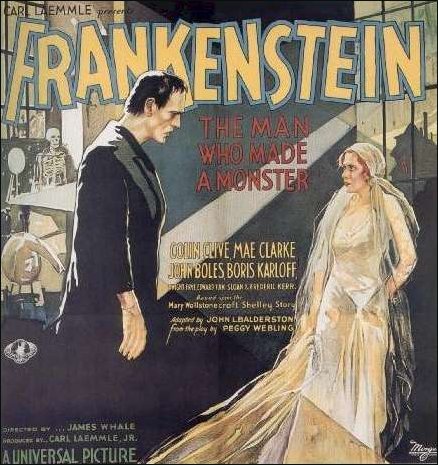
Frankenstein: The Man Who Made a Monster (1931), image via "Frankenstein Links" Bibi's box <http://bibi.org/2005/09/frankenstein_li/> 〔Bibi さんのブログ 2005.9.20〕
.jpg)
Frankenstein: The Man Who Made a Monster (1931), image via "Frankenstein (1931 film)" Wikipedia <http://en.wikipedia.org/wiki/Frankenstein_(1931_film)>
『あしながおじさん』でのシャーロット・ブロンテの『ジェーン・エア』からの引用は明示してあるのになんで違っているんだろう [Daddy-Long-Legs]
間があいて、なんだか『あしながおじさん』から離れているなあ、とちょっと反省した師走です。
で、謎が解決されていないままの問題箇所をばーんと出して、冬休みの課題としたいと思います(わけわかめ)。2年生5月4日の手紙は、体育祭の報告から始まるのですが、前の夜に半分徹夜して『ジェーン・エア』を読んでいたことが途中で書かれています。ブロンテ姉妹については、『嵐が丘』を書いたエミリー・ブロンテについては1年生の春の手紙で言及があって、作家の置かれた環境と、作品を生み出す能力について、思索がちょっとだけ巡らされていましたが、孤児の娘を主人公とした『ジェーン・エア』はジュディーの生涯と響きあうところがあり(また、メタなレヴェルでは狂気の奥さんの存在を知るというジーンの生涯と重なるところもあり)、いよいよか、という感じがなきにしもあらず(しかし、あれこれ言うのは今回は控えます)。
さて、引用は、引用符つきと引用符なしと、二箇所あります。
<http://www.archive.org/stream/daddylonglegs00websrich#page/150/mode/2up>
I sat up half of last night reading Jane Eyre. Are you old enough, Daddy, to remember sixty years ago? And, if so, did people talk thatway?
The haughty Lady Blanche says to the footman, "Stop your chattering, knave, and do my bidding." Mr. Rochester talks about the metal welkin when he means the sky; and as for the mad woman who laughs like a hyena and sets fire to bed curtains and tears up wedding veils and bites―it's melodrama of the purest, but just the same, you read and read and read. I can't see how any girl could have written such a book, especially any girl who was brought up in a churchyard. There's something about those Brontes that fascinates me. Their books, their lives, their spirit. Where did they get it? When I was reading about little Jane's troubles in the charity school, I got so angry that I had to go out and take a walk. I understood exactly how she felt. Having known Mrs. Lippett, I could see Mr. Brocklehurst.〔赤字・太字強調付加〕
(昨日の夜の半分は『ジェーン・エア』を読んで夜更かししました。ダディーって、六十年前を覚えているくらいのおとしですか? もしそうならば、昔の人ってあんなふうに話したのですか?
横柄なレディー・ブランチは従僕に言います――「無駄口は叩くでない、下男風情が。言いつけ通りにするのじゃ」 ミスター・ロチェスターは、空を意味して金属の雲居が云々なんて言ってるしー。それからあの狂女、ハイエナのように高笑いしたり、ベッドのカーテンに火をつけ、婚礼の衣装を引き裂き、人に噛みつくだなんて――これは純然たるメロドラマです、が、それでも、読んで読んで読まずにいられません。どうして女の子がこんな本を書けたのか、わたしにはわかりません。特に、教会の敷地から出ることなく育った娘なんかには。このブロンテ姉妹には、あたしを魅了するものが何かあります。彼女たちの本も、彼女たちの生涯も、彼女たちの精神も。彼女らはその精神をどこで得たのでしょう? 慈善学校でまだ小さいジェインが苦労するのを読んでいると、あんまり腹が立って、外に飛びだして散歩せずにいられませんでした。あの子がどんなふうに感じたか、わたしには痛いほどわかる。ミセス・リペットを知っているので、ミスタ・ブロックルハーストの姿をまざまざと目に浮かべられます。)
英語を赤字にした二箇所は、前後しますが、18章と15章に出てきます。なんとなく長めに引いておきます。関連部分を茶色の太字にしておきます。――
"You never felt jealousy, did you, Miss Eyre? Of course not: I need not ask you; because you never felt love. You have both sentiments yet to experience: your soul sleeps; the shock is yet to be given which shall waken it. You think all existence lapses in as quiet a flow as that in which your youth has hitherto slid away. Floating on with closed eyes and muffled ears, you neither see the rocks bristling not far off in the bed of the flood, nor hear the breakers boil at their base. But I tell you―and you may mark my words―you will come some day to a craggy pass in the channel, where the whole of life's stream will be broken up into whirl and tumult, foam and noise: either you will be dashed to atoms on crag points, or lifted up and borne on by some master-wave into a calmer current―as I am now.
"I like this day; I like that sky of steel; I like the sternness and stillness of the world under this frost. I like Thornfield, its antiquity, its retirement, its old crow-trees and thorn-trees, its grey facade, and lines of dark windows reflecting that metal welkin: and yet how long have I abhorred the very thought of it, shunned it like a great plague-house? How I do still abhor―"
He ground his teeth and was silent: he arrested his step and struck his boot against the hard ground. Some hated thought seemed to have him in its grip, and to hold him so tightly that he could not advance. (Chapter 15) 〔茶字・太字強調付加〕
"Indeed, mama, but you can―and will," pronounced the haughty voice of Blanche, as she turned round on the piano-stool; where till now she had sat silent, apparently examining sundry sheets of music. "I have a curiosity to hear my fortune told: therefore, Sam, order the beldame forward."
"My darling Blanche! recollect―"
"I do―I recollect all you can suggest; and I must have my will―quick, Sam!"
"Yes―yes―yes!" cried all the juveniles, both ladies and gentlemen. "Let her come―it will be excellent sport!"
The footman still lingered. "She looks such a rough one," said he.
"Go!" ejaculated Miss Ingram, and the man went.
Excitement instantly seized the whole party: a running fire of raillery and jests was proceeding when Sam returned.
"She won't come now," said he. "She says it's not her mission to appear before the 'vulgar herd' (them's her words). I must show her into a room by herself, and then those who wish to consult her must go to her one by one."
"You see now, my queenly Blanche," began Lady Ingram, "she encroaches. Be advised, my angel girl―and―"
"Show her into the library, of course," cut in the "angel girl." "It is not my mission to listen to her before the vulgar herd either:
I mean to have her all to myself. Is there a fire in the library?"
"Yes, ma'am―but she looks such a tinkler."
"Cease that chatter, blockhead! and do my bidding."
Again Sam vanished; and mystery, animation, expectation rose to full flow once more.
"She's ready now," said the footman, as he reappeared. "She wishes to know who will be her first visitor."
"I think I had better just look in upon her before any of the ladies go," said Colonel Dent. (Chapter 18) 〔茶字・太字・大字強調付加〕
15章のメタル・ウェルキンのほうは原文のままのフレーズで引用されています。welkin は、辞書を見ると、文語とか詩語で、「空」「大空」「上空」「天」「天空」とか書いてあります(ドイツ語のWolke (雲)と語源が同じで、古英語までさかのぼる古い言葉らしい)。小説のなかでは、その表現に至るまでにsky of steelという表現があったりして、金属のメタルの突飛さがやわらいでいるようです。
しかし、この、レディー・ブランチのセリフのブレ・ズレはなんなんでしょうか。a) ジーン・ウェブスターの記憶違い、b) ジーン・ウェブスターの意図的な改変、c) このように表記しているリトールド版みたいな別の版があった。
謎〔灰字・太字・大字強調付加〕
だいじょうぶだよのエール "All Right" Yelling [When Patty]
.jpg)
Revere F. Wistehuff (1900 – 1971), Cheerleader Yelling into Megaphone (c. 1930s), image via American Gallery: Greatest American Painters <http://americangallery.wordpress.com/2009/06/03/revere-f-wistehuff-1900-1971/>
When Patty Went to College (『パティーが大学生だった頃』)の第13章「外のもの音」で、パティーが「外のもの音」を忘れ、結果、役者たちがセリフをごまかした芝居の上演を終えたあとの一節――
Patty crawled out from under the balcony and fell on her knees at Georgie's feet.
Lord Bromley raised her up. "Never mind, Patty. The audience doesn't know the difference; and, anyway, it was all for the best. My mustache wouldn't have stayed on more than two minutes longer."
They could hear some one shouting in the front, "What's the matter with Georgie Merriles?" and a hundred voices replied, "She's all right!"
"Who's all right?"
"G-e-o-r-g-i-e M-e-r-r-i-l-e-s."
"What's the matter with the cast?"
"They're all right!"
The stage-door burst open and a crowd of congratulatory friends burst in and gathered around the disheveled actors and committee. "It's the best senior play since we've been in college." "The freshmen are simply crazy over it." "Lord Bromley, your room will be full of flowers for a month." "Patty," called the head usher, over the heads of the others, "let me congratulate you. I was in the very back of the room, and never heard a thing but your crash. It sounded fine!"
"Patty," demanded Georgie, "what in the world were you doing?"
"I was counting the stars," said the contrite Patty, "and then I remembered too late, and I turned around suddenly, and it fell off. I am terribly sorry." <http://www.gutenberg.org/files/21639/21639-h/21639-h.htm>(パッティは、バルコニーの下からはい出してきて、ジョージーの足もとにひざまずいた。〈ブロムリー卿〉のボニーが、パッティを立たせていった。
「気にしなくていいのよ、パッティ。観客は気づかなかったわ。それに、どっちにしろ、あれでなにもかもよかったのよ。あのままあそこにいたら、あたしの口ひげ、あと二分しかもたなかったのよ」
出演者や委員たちは、見物席の前のほうからだれかがさけんでいるのを聞いた。
「ジョージーはどう?」
「申し分ないわ」
と、数百の声が答えた。
「だれが申し分ないの」
「ジョー・・・ジー・メ・・・リ・・・ル・・・ス」
「出演者はどう?」
「みんな申し分ないわ」
ステージドアがいきなりあいて、祝いをいおうとする友人たちがなだれこみ、そして、衣装を乱した出演者や委員をとりかこんだ。
「この大学へきて以来、最高の劇だったわ」
「一年生たちは、ただもう感激よ」
「ブロムリー卿、あんたの部屋は、この一か月間、花だらけになるわ」
場内係の責任者キャシーが、みんなの頭ごしに呼んだ。
「パッティ、あたしにお祝いをいわせて、あたしは、ホールのいちばんうしろにいたので、あんたの〈もの音〉のほか、なにも聞こえなかったわ。とってもいい音だったわ!」
ジョージーがつめよった。
「パッティ、いったい、あんたはなにをしてたの?」
後悔でうちひしがれたパッティはいった。
「あたし、星をかぞえてたの。それから思い出したときは、もう時すでにおそしだったのよ。いきなりふりむいたら、あれがおっこっちゃって。ほんとうにごめんなさい。」(内田庶訳『おちゃめなパッティ大学へ行く』 260-262)
で、太字のところに注意していただいて、つぎの一節は『あしながおじさん』の2年生5月4日付の手紙で体育祭の報告をするところです。――
[. . .] I won the fifty-yard sprint (eight seconds).
I was pretty panting at the end, but it was great fun, with the whole
class waving balloons and cheering and yelling:
What's the matter with Judy Abbott?
She's all right.
Who's all right?
Judy Ab-bott!
That, Daddy, is true fame. Then trotting back to the dressing tent and being rubbed down with alcohol and having a lemon to suck.
(わたしは50ヤード走で勝ちました(8秒)。
最後は息がハーハー切れてましたけれど、学年のみんなが風船を振ったりチアや声援を送ってくれたりして、とても楽しかったです。
どうしたジューディー・アボット?
彼女ならだいじょうぶ
誰がだいじょうぶ?
ジューディー・アボットよ!
これは、たいへんな名誉なのです、ダディー。それから更衣用のテントにヒョコヒョコ戻ると、アルコールでマッサージしてもらい、すするレモンをもらい。)
いわゆるチアリーディングのchant というかyell というかは、たくさんあって、YouTube で探すのも容易ではないのですけれど、どうやら "All Right" と呼ばれてきた、遅くとも1880年代には存在していた応援のコトバのようです(1888年のシンシナティ市市制100年回顧する文章を1988年の市制200年のときに記述したCincinnati Magazin の記事――<http://books.google.co.jp/books?id=kx8DAAAAMBAJ&pg=PT9&lpg=PT9&dq=%22What's+the+matter+with%22++%22all+right%22++%22Who's+all+right%22&source=bl&ots=zshiRvMG8H&sig=_CCR_6NzKxrbOO6eqUjuq9WY7a4&hl=ja&ei=riArS4_9BoHq7APtk7iFBg&sa=X&oi=book_result&ct=result&resnum=1&ved=0CAgQ6AEwAA#v=onepage&q=%22What's%20the%20matter%20with%22%20%22all%20right%22%20%22Who's%20all%20right%22&f=false>)。あるいは1895年11月4日のNew York Times の記事 "New York's Poisonous Plants" <http://query.nytimes.com/mem/archive-free/pdf?res=9C02E0DF1E3DE433A25757C1A9679D94649ED7CF> に描かれた大学の教室でのやりとり。
Wikipedia の "Cheerleading" <http://en.wikipedia.org/wiki/Cheerleading> を見ると、1898年のミネソタ大学をチアリーディングの始まりみたいに書いているみたいなので、そして、上のふたつの記事は、純然たるスポーツの声援ではないので、この文句自体がいわゆるチアリーディング以前から存在していたのかもしれないですが、よくわかりません。
ともあれ、cheering、yelling においては、チアリーダーが "What's the matter with XXX?" 〔XXX は校名やチーム名や人名〕と観客に尋ね、観客が "XXX is all right." と答え、さらにチアリーダーが "Who's all right?" と再度訊いて、名前が叫ばれる、という形式が受け継がれてきたようです。
で、パティーのほうのは、このエールのパロディーだと思われるわけです。"G-e-o-r-g-i-e M-e-r-r-i-l-e-s." の部分はチアの応酬によくあるようにアルファベットを読んだのではないかと推測されます(自信はない)。いや、ちがうな。ただゆっくりと発音している感じですか。ですね。
/////////////////////////////////
"Girls' Athletics <http://www.elks.net/YearBooks/1929/girls.htm> 〔Round Valley High School の1929年ごろのスポーツ活動を記述したページ。写真付き〕
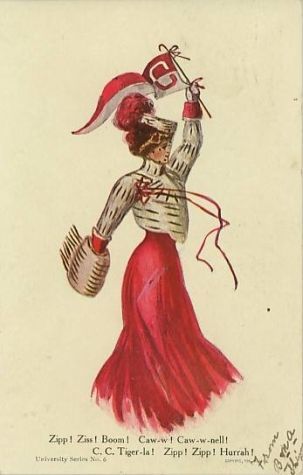
1906年のコーネル大学のチアリーダーの絵葉書 via "Cheerleading," Wikipedia <http://en.wikipedia.org/wiki/Cheerleading>
"C-H-E-E-R-S~A Collection of Cheerleaders' Favorite Cheers" <http://cheerleading.about.com/od/cheerschantsyells/a/040301a.htm>
パックス・ティビ Pax Tibi [Daddy-Long-Legs]
朝からの会議に出たあと午後早くに帰宅し、osawa さんの残した更新日記(同時進行多方面のWEB作業の記録)をビール(ほんとうは発泡酒)を注ぎながら、あらためて感心しつつ飲んで、いや読んでいた師走の夕方でした。
2年生1月20日の手紙(バシュキルツェフの天才=狂気に言及した手紙のつぎの手紙)の〆の文句は独・仏・羅が並んでいます。それは外国語の勉強成果の開陳であるだけでなく、手紙本文で、自分の素性のわからなさをあらためて問題にし、ひょっとすると自分はアメリカ人ではないかもしれない(もっとも多くの人々がアメリカ人ではない)という移民の国アメリカに思いをはせる言葉があったり、ロシア人の子孫かもしれないし、ヴァイキングの娘かもしれないし、古代ローマ人の直系かもしれない、みたいなことをあれこれ書いたからでもあるでしょう。
Jean Webster, Daddy-Long-Legs (New York: Century, 1912) <http://www.archive.org/stream/daddylonglegs00websrich#page/126/mode/2up>
「すごくおもろい手紙を今回は書くつもりだったので、申し訳ないです。」と言っているのは、孤児院時代の「スキャンダル」――クッキーを盗んだと責められて脱走を試みたけれど、4マイル走ったところで捕まり、一週間庭で見せしめに棒くいに縛られたという事件――を告白し、そしてそれを書いたところで鐘が鳴ってしまい、委員会に出るため手紙を〆たからです。(でも、あとから続けてもよかったわけですから、これは言い訳であり、それくらい、悲しいことを書いてしまった自分がいた、ということなのでしょうが。)
あと、追伸の、「完璧に確信していること」として、「自分は支那人ではない」というのが、どういう含みなのか、よくわかりません。が、当時は "Chinaman" という言い方自体は、derogatory (侮蔑的)ではなかったのは確かです(世紀末のフランク・ノリスの『マクティーグ』にも出てくるし、1920年代のフィッツジェラルドの小説にも出てくる)。
Auf wiedersehen アウフ・ヴィーダーゼーン(ではまた、さようなら(独))
Cher Daddy シェール・ダディー(親愛なる(仏)ダディー)
Pax tibi! パックス・ティビ!((羅))
で、つぎのようなノートを読んで、意外な読みに半分は感心したのでした――
- パックス・ティビ
- 訳注にも書きましたが、pax tibi=「脛骨の平和」の意味で、脛骨(tibia)は足長さん(Daddy-Long-Legs)の脚(leg)にひっかけた冗談です。
始めはなんのことだかさっぱり分からずじまい。 paxから、足長さんへのいたわりの言葉なのは予想がつくのですが、ラテン語、英語、フランス語の辞書をみても、tibiに類した言葉はtibiaしか見あたらず、成句としての意味も見つかりません。脛骨にからんだ言い伝えや民間信仰などがあるのか調べてみたけど、それらしいものもなし。最後にジュディの冗談の線で考えていたら、布団の中で眠りに着く直前、足長さんのlegとの関連にようやく気がつきました。でもそこで目がさえてしまって、しばらく眠れませんでしたけど。英語で考えていればすぐ気付くのでしょうね。
ちなみに、Pocket版のOxford Latin Dictionaryには、 tibi=reed-pipe(リードパイプ、オーボエ系の楽器)の意味しか載ってなくて、全くの役立たず。安物の辞書は百害あって一利なしです。値段だけは一人前なのに...
急いで手に取った翻訳がたまたま福音館の坪井郁美訳(1970)で、それはたまたまAuf wiedersehen にルビで「さようなら」、とCher Daddy に「おじさん」と振られて、その二行のあとは、「ジュディー」だけ。なぜかPax tibi が落ちていたのでした。
けれども続けて手にした恩地三保子訳は「いずれまた」にルビ「アウフ・ヴィーダゼーエン」、「だいすきなおじさま」にルビ「シェール・ダディ」、そして「ごきげんよう」に「パックス・ティビ」と書いています。角川文庫の厨川圭子訳はAuf wiedersehenに割注で(さようなら)〔Auf wiedersehen(さようなら)〕、「Cher(親愛なる)おじさん」、「Pax tibi(ご安泰を祈ります)」と、日本語に置き換えているのでした。
で、モーリちゃんの父の大学時代に途中で挫折したラテン語(ギリシア語も同様に挫折しました)の知識だと、tibi は二人称単数形人称代名詞の与格(目的格)です〔「あなたに」/to you〕。主格はフランス語と同じでtu。Pax は、Pax romana とか Pax americana とか言われるように、peace (平和)。
そして、あれこれ調べると、"Pax tibi" というフレーズはキリスト教がらみで見つかるようです。――
Pax tibi!: (Lt.) Peace (be) unto thee [you]! Long before the founding of the city, however, St. Mark is said to have traveled to the north of Italy and founded the first Christian community there. When he was traveling back to Rome by sea, his ship stopped at the islands which would one day become Venice. An angel appeared to him saying “Pax tibi, Marce, evangelista meus. Hic requiescet corpus tuum” (Peace unto you, Mark, my Evangelist. Here your body will rest). (http://www.catholicmatch.com/pl/pages/community/articles/details.html?ra=1;id=542)でもマルコの専用ではなくて、カトリックの洗礼式にも入っています。
| Deus omnipotens, Pater Domini nostri Iesu Christi, qui te regeneravit ex aqua et Spiritu Sancto, quique dedit tibi remissionem omnium peccatorum (hic inungit), ipse te liniat Chrismate salutis in eodem Christo Iesu Domino nostro in vitam æternam. R7 : Amen. Sacerdos: Pax tibi. R7 : Et cum spiritu tuo. | May Almighty God, the Father of our Lord Jesus Christ, who has given you new life through water and the Holy Ghost, and forgiven you all your sins (here he anoints the child) himself anoint you with saving Chrism in the same Jesus Christ our Lord, that you may have eternal life. R7 : Amen. Priest: Peace be with you. R7 : And with you. |
(http://members.aol.com/Genesis27Life/TradRiteBaptism.html)
「平和があなたに(あらんことを(願います))」 という意味だと思われ。複数だとPax vobis。浄罪界から10000年免除に値する Deserving Ten Thousand Years Out of Purgatory [Daddy-Long-Legs]
前の記事の Pax tibi がカトリックの祭式の文言なのかどうかは不確かですけれど、『あしながおじさん』に出てくるカトリック的なイメジとして気になっていた箇所(4年生4月12日)――
12th Jan.
Dear Mr. Philanthropist,
Your cheque for my family came yesterday. Thank you so much! I cut gymnasium and took it down to them right after luncheon, and you should have seen the girl's face! She was so surprised and happy and relieved that she looked almost young; and she's only twenty-four. Isn't it pitiful?
Anyway, she feels now as though all the good things were coming together. She has steady work ahead for two months―someone's getting married, and there's a trousseau to make.
'Thank the good Lord!' cried the mother, when she grasped the fact that that small piece of paper was one hundred dollars.
'It wasn't the good Lord at all,' said I, 'it was Daddy-Long-Legs.' (Mr. Smith, I called you.)
'But it was the good Lord who put it in his mind,' said she.
'Not at all! I put it in his mind myself,' said I.
But anyway, Daddy, I trust the good Lord will reward you suitably. You deserve ten thousand years out of purgatory.
Yours most gratefully,
Judy Abbott(慈善・家人《じぜん・いえと》様へ
例の家族のための小切手は昨日届きました。ありがとうございます! 昼食後に、体育の授業をサボってさっそく持って行きました。あの娘《こ》の顔を見せてあげたかった! あまりびっくりしたのと、幸せなのと、安心したので、若返ったみたいに見えたわ。 といってもまだ二十四歳でしかないんだけど。可哀想でしょ?
とにかく、まるで幸運があるだけまとめて舞い込んできたかのような気でいます。 二ヶ月先までずっと仕事もあるし -- どなたかもうすぐ結婚するので、その嫁入り仕度なの。
「ありがとうございます、恵み深き神よ!」と、お母さんはそう叫びました。 あの小さな紙切れが百ドルになるんだとようやく納得してくれたわけ。
「恵み深い神さまじゃなくて」とあたし、「足長父さん《メクラグモ》のおかげです。」 (ミスタ・スミスのおかげ、ちゃんとそう言ったわよ。)
「でも恵み深い神さまが、そう思いつかせて下さったんだわ」とお母さん。
「まさか!思いつかせたのはこのあたしです」とあたし。
それはともあれ、「父さん」、恵み深い神さまなら、きっと相応しく報いて下さることでしょう。 これで煉獄行きの一万年分くらいは儲けたわね。
ありがたく感謝している
ジュディ・アボット
〔osawa さん訳 <http://web.archive.org/web/20040915032219/www.sm.rim.or.jp/~osawa/AGG/daddy/daddy-67.html>〕)
煉獄(purgatory)というのは、ダンテの『神曲』で有名かもしれませんけれど、Heaven と Hell の中間にあって、地上の罪を浄める(そして最後の審判と「永遠の救済」(=いわゆる「選ばれし人」となる)を待つ)場所なので、浄罪界とも呼ばれます。ウィキペディアを引いておきます。――
煉獄(れんごく ラテン語: purgatorium)とは、キリスト教、カトリック教会の教義のひとつ。 すなわち、煉獄とは死後地獄へ至るほどの罪はないが、すぐに天国に行けるほどにも清くない魂が、その小罪を清めるため赴くとされる場所であるとする。第2バチカン公会議以降の教会の現代化の流れにより、現代のカトリック教会においても煉獄について言及されることはほとんどない。
煉獄の教義は、教会の東西分裂以降のカトリック教会にて成立した。このような経緯のため正教会では煉獄を認めない。またプロテスタント教派もルターを始めとして煉獄の教義を認めない。古くは「浄罪界」とも訳される。〔「煉獄」 Wikipedia < http://ja.wikipedia.org/wiki/%E7%85%89%E7%8D%84 >〕
贖宥状(しょくゆうじょう)とは16世紀、カトリック教会が発行した罪の償いを軽減する証明書。免償符、贖宥符とも。ラテン語の "indulgentia" の訳で、日本ではかつて「免罪符」と訳されていたが、"indulgentia" には免罪という意味はない上、贖宥状が「罪のゆるし」を与えるのではなく、「ゆるしを得た後に課せられる罪の償いを軽減する」ものであるため、「免罪符」 という訳語は適当ではないことに注意する必要がある。〔Wikipedia〕
/////////////////////////////////////////////
「贖宥状」 Wikipedia <http://ja.wikipedia.org/wiki/%E8%B4%96%E5%AE%A5%E7%8A%B6>
"Indulgence" Wikipedia <http://en.wikipedia.org/wiki/Indulgence>
煉獄と天国の関係はどういうものなのでしょうか The Heaven and the Purgatory [φ(..)メモメモ]
前の記事でも引用したように、日本語のウィキペディアの記事「煉獄」は、「煉獄(れんごく ラテン語: purgatorium)とは、キリスト教、カトリック教会の教義のひとつ。 すなわち、煉獄とは死後地獄へ至るほどの罪はないが、すぐに天国に行けるほどにも清くない魂が、その小罪を清めるため赴くとされる場所であるとする。」と定義を与え、さらに、「第2バチカン公会議以降の教会の現代化の流れにより、現代のカトリック教会においても煉獄について言及されることはほとんどない。」こと、また「正教会では煉獄を認めない。またプロテスタント教派もルターを始めとして煉獄の教義を認めない。」との説明を付加していました。
実は個人的にかねて気になっていたのは、煉獄(浄罪界)のような超現実空間がなければ、最後の審判(そして神の国への参入)まで、キリスト教徒の死者はどこにいるんだろう、ということなのでした。もちろん上のウィキペディアの記事にあるように天国か地獄ということでしょう。
しかし、モーリちゃんの父の知識では、擬似空間的に、天国を「この世」から超絶した場所として想定する世界観は、もともとはキリスト教が異端としたグノーシス主義の宇宙像にこそあるもので、キリスト教、特にピューリタニズムは、終末論を核心に置く時間的な世界観をもったのではなかったか。さらに、永遠回帰的な円環的時間でもなく、直線的・進化論的世界観を時間にこだわることでつくりあげたのがキリスト教ヨーロッパ文明ではなかったのでしょうか。死んで天国へ行くというのは正統教義ではなくて俗信だということは、日本語ウィキペディアの「天国」 <http://ja.wikipedia.org/wiki/%E5%A4%A9%E5%9B%BD> にも書かれています(もっとも「独自研究」云々の嫌疑がかけられているようですけど)。――
キリスト教世界における天国一般に「善き死者の赴く処」とされる天国の概念は、ギリシャ神話のオリンポスや北欧神話のアースガルズとユダヤ・キリスト教の天(=神の居場所)、イエスの説いた神の国などが民衆レベルで混ざり合って成立しており[要出典]、純粋なキリスト教の教えとは言えない[誰?] 。キリスト教の教理では、最後の審判以前の死者がどこでどのような状態にあるのかについて、各教派間の統一見解を得るに至っていない。
ダンテの『神曲』では、地球を中心として同心円上に各遊星の取り巻くプトレマイオスの天動説宇宙を天国界とし、恒星天、原動天のさらに上にある至高天を構想していた。
「要出典」とか「誰?」とか書かれているのが悩ましさを伝えておるようです。
もちろん、天国での死後の世界や天使の奏楽やら、というのは絵画の題材になってきたのだし、アメリカ文学でいえば、初期植民地時代のピューリタンのエレジーや墓碑銘にも来世(天国)での(真の)生が(どうみても最後の審判以前に)期待されていますし、キリスト教倫理を大切にした19世紀のナサニエル・ホーソーンみたいな作家の小説(たとえば短篇の「優しい少年」や有名な長篇『緋文字』)にも天国の敷居や舗道みたいなのが描かれています。
で、よくわからんですね。煉獄みたいな中間的・モラトリアム的時空間があれば、最後の審判まで待てるでしょうが(辛いかもしらんけど・・・・・・先に逝った人のほうが永く煉獄にいるというのはどういうことだ、みたいな疑念がどこからか提出されそうですけれど、煉獄10000(0)年免除みたいな、地上的時間を相対化し、歴史的差異を無化するような時間が永遠(神の国)の前には流れるなのかもしれません)。
敢えて世俗的・文学的コンテクストで言えば、勧善懲悪 distribution of prizes 的なオチを付けたいときに、倫理的最終判断が地獄堕ちとか天国で天使に迎えられ、とかいうふうに結着してほしいという期待はわかります(みんな煉獄へ逝っちゃうんじゃいっしょくたになっちゃうし)。そしてそれ以前に、現実の死者の葬送において死後の生の期待が天国を切望するのもわかるように思えます。
ところで、purgatory について検索してあれこれ見ていて、意外なヒットだったのは、ジーン・ウェブスターの1905年の小説『小麦姫 The Wheat Princess』なのでした。
さらに、もっとあとのほうで――
"I think," she commented, "that I prefer a religion which does n't have a purgatory." (「私は煉獄を持たない宗教を選びたいと思います」)
"Purgatory," he returned, "has always struck me as quite superior to anything the Protestants offer. It really gives one something to die for." (「煉獄は、プロテスタントが提示する何ものよりもまったく優れたものとずっと私には感じられました。人に、それのために死ぬ場を真に与えてくれます」)
"I should think, for the matter of that, that heaven direct would give one something to die for." (「それをいうなら、天国直行というのが人に、何のために死ぬかという場を与えるものではないでしょうか」)
"What, for instance? Golden paving-stones, eternal sunshine, and singing angels!" (「え、たとえばこういうこと? 黄金の敷石、永遠の陽光、歌う天使たち!」)
"Oh, not necessarily just those things. They 're merely symbolical." (「あら、必ずしもそういうものだけではないわ。そういうのはただの象徴にすぎません」)
すげー適当な訳です。この小説は、ヴァッサー大学を1901年に卒業したウェブスターが、1903年に、在学中に書いていた短篇をまとめるかたちで出した最初の学園物『パティーが大学生だったころ』を出した、翌々年の1905年に発表した、ヨーロッパが舞台の物語です。実は何年か前にウェブスターの本を集めたときにこの本だけ手に入らず、読んでいません(ほんとは買ったのも読んでないのがあるのですけれどw)。 ウェブスターの推理小説『フォー・プールズの謎』(1909)以上に読まれておらんのではないか、と推測します(なにしろこちらは自分が読んでいるくらいですから)。
冬休みに読めたら読んでみたいと思います。
ということで、これはφ(..)メモメモです。
///////////////////////////////////
『あしながおじさん』のなかのサミュエル・ピープス(1) Samuel Pepys in Daddy-Long-Legs [Daddy-Long-Legs]
天国煉獄地獄問題はむつかしいので先送りにします。そして、『あしながおじさん』の重箱のスミツツキは順序は適当なのですけれど、4年生1月12日の煉獄に言及する手紙の次の2月15日の手紙はサミュエル・ピープスなので、そちらに話を移してしまいます。
まずは、テキストを並べてみますか。
15th Feb.
May it please Your Most Excellent Majesty:
This morning I did eat my breakfast upon a cold turkey pie and a goose, and I did send for a cup of tee (a china drink) of which I had never drank before.
Don't be nervous, Daddy--I haven't lost my mind; I'm merely quoting Sam'l Pepys. We're reading him in connection with English History, original sources. Sallie and Julia and I converse now in the language of 1660. Listen to this:
"I went [out] to Charing Cross to see Major Harrison hanged, drawn and quartered: he looking as cheerful as any man could do in that condition." And this: "Dined with my lady who is in handsome mourning for her brother who died yesterday of spotted fever."
Seems a little early to commence entertaining, doesn't it? A friend of Pepys devised a very cunning manner whereby the king might pay his debts out of the sale to poor people of old decayed provisions. What do you, a reformer, think of that? I don't believe we're so bad today as the newspapers make out.
Samuel was as excited about his clothes as any girl; he spent five times as much on dress as his wife--that appears to have been the Golden Age of husbands. Isn't this a touching entry? You see he really was honest. 'Today came home my fine Camlett cloak with gold buttons, which cost me much money, and I pray God to make me able to pay for it.'
Excuse me for being so full of Pepys; I'm writing a special topic on him.
What do you think, Daddy? The Self-Government Association has abolished the ten o'clock rule. We can keep our lights all night if we choose, the only requirement being that we do not disturb others--we are not supposed to entertain on a large scale. The result is a beautiful commentary on human nature. Now that we may stay up as long as we choose, we no longer choose. Our heads begin to nod at nine o'clock, and by nine-thirty the pen drops from our nerveless grasp. It's nine-thirty now. Good night. (Daddy-Long-Legs [Penguin Classics] 117-118)
Samuel Pepys (1633-1703)は、1660年から69年に書かれた Diary 、特に、Great Plague of London (1665-66) の疫病の記録で有名な英国の官僚、政治家です。仕立て屋に生まれますが、ケンブリッジ大学を卒業し、役人になり、1660年の王政復古下で、親戚のエドワード・モンタギューに推薦されて海軍の長官秘書(書記官)という地位にまで昇ります。妻のエリザベスはフランスから亡命してきたたプロテスタントの娘でした。
ピープスのE-text はいろいろあるみたいですけれど、注釈が挿入されている19世紀末の版が良いかな、と思います(Project Gutenberg)。もしかするとジュディー=ジーンが使用した版かもしれませんし。――THE DIARY OF SAMUEL PEPYS M.A. F.R.S. /CLERK OF THE ACTS AND SECRETARY TO THE ADMIRALTY /TRANSCRIBED FROM THE SHORTHAND MANUSCRIPT IN THE PEPYSIAN LIBRARY MAGDALENE COLLEGE CAMBRIDGE BY THE REV. MYNORS BRIGHT M.A. LATE FELLOW AND PRESIDENT OF THE COLLEGE (Unabridged) /WITH LORD BRAYBROOKE'S NOTES /By Samuel Pepys /Edited With Additions By
Henry B. Wheatley F.S.A. (London: George Bell & Sons, 1893) <http://www.gutenberg.org/files/157/157.txt> <http://www.gutenberg.org/files/4118/4118.txt>
<http://infomotions.com/etexts/gutenberg/dirs/4/1/2/4125/4125.htm>
DIARY OF SAMUEL PEPYS.SEPTEMBER 1660
6th. This morning Mr. Sheply and I did eat our breakfast at Mrs. Harper's, (my brother John' being with me,) [John Pepys was born in 1641, and his brother Samuel took great interest in his welfare, but he did not do any great credit to his elder.] upon a cold turkey-pie and a goose. From thence I went to my office, where we paid money to the soldiers till one o'clock, at which time we made an end, and I went home and took my wife and went to my cosen, Thomas Pepys, and found them just sat down to dinner, which was very good; only the venison pasty was palpable beef, which was not handsome. After dinner I took my leave, leaving my wife with my cozen Stradwick,--[Elizabeth, daughter of Richard Pepys, Lord Chief Justice of Ireland, and wife of Thomas Stradwick.]--and went to Westminster to Mr. Vines, where George and I fiddled a good while, Dick and his wife (who was lately brought to bed) and her sister being there, but Mr. Hudson not coming according to his promise, I went away, and calling at my house on the wench, I took her and the lanthorn with me to my cosen Stradwick, where, after a good supper, there being there my father, mother, brothers, and sister, my cosen Scott and his wife, Mr. Drawwater and his wife, and her brother, Mr. Stradwick, we had a brave cake brought us, and in the choosing, Pall was Queen and Mr. Stradwick was King. After that my wife and I bid adieu and came home, it being still a great frost.
25th. To the office, where Sir W. Batten, Colonel Slingsby, and I sat awhile, and Sir R. Ford[Sir Richard Ford was one of the commissioners sent to Breda to desire Charles II. to return to England immediately.] coming to us about some business, we talked together of the interest of this kingdom to have a peace with Spain and a war with France and Holland; where Sir R. Ford talked like a man of great reason and experience. And afterwards I did send for a cup of tee [That excellent and by all Physicians, approved, China drink, called by the Chineans Tcha, by other nations Tay alias Tee, is sold at the Sultaness Head Coffee-House, in Sweetings Rents, by the "Royal Exchange, London." "Coffee, chocolate, and a kind of drink called tee, sold in almost every street in 1659."--Rugge's Diurnal. It is stated in "Boyne's Trade Tokens," ed. Williamson, vol. i., 1889, p. 593 "that the word tea occurs on no other tokens than those issued from 'the Great Turk' (Morat ye Great) coffeehouse in Exchange Alley. The Dutch East India Company introduced tea into Europe in 1610, and it is said to have been first imported into England from Holland about 1650. The English "East India Company" purchased and presented 2 lbs. of tea to Charles II. in 1660, and 23 lbs. in 1666. The first order for its importation by the company was in 1668, and the first consignment of it, amounting to 143 lbs., was received from Bantam in 1669 (see Sir George Birdwood's "Report on the Old Records at the India Office," 1890, p. 26). By act 12 Car. II., capp. 23, 24, a duty of 8d. per gallon was imposed upon the infusion of tea, as well as on chocolate and sherbet.] (a China drink) of which I never had drank before, and went away. Then came Col. Birch and Sir R. Browne by a former appointment, and with them from Tower wharf in the barge belonging to our office we went to Deptford to pay off the ship Success, which (Sir G. Carteret and Sir W. Pen coming afterwards to us) we did, Col. Birch being a mighty busy man and one that is the most indefatigable and forward to make himself work of any man that ever I knew in my life. At the Globe we had a very good dinner, and after that to the pay again, which being finished we returned by water again, and I from our office with Col. Slingsby by coach to Westminster (I setting him down at his lodgings by the way) to inquire for my Lord's
OCTOBER 1660
DIARY OF SAMUEL PEPYS.
JULY 1661
3rd. To Westminster to Mr. Edward Montagu about business of my Lord's, and so to the Wardrobe, and there dined with my Lady, who is in some mourning for her brother, Mr. Saml. Crew, who died yesterday of the spotted fever. So home through Duck Lane' to inquire for some Spanish books, but found none that pleased me. So to the office, and that being done to Sir W. Batten's with the Comptroller, where we sat late talking and disputing with Mr. Mills the parson of our parish. This day my Lady Batten and my wife were at the burial of a daughter of Sir John Lawson's, and had rings for themselves and their husbands. Home and to bed.
DIARY OF SAMUEL PEPYS.
JULY 1660
July 1st. This morning came home my fine Camlett cloak, [Camlet was a mixed stuff of wool and silk. It was very expensive, and later Pepys gave L24 for a suit. (See June 1st, 1664.)] with gold buttons, and a silk suit, which cost me much money, and I pray God to make me able to pay for it. I went to the cook's and got a good joint of meat, and my wife and I dined at home alone. In the afternoon to the Abbey, where a good sermon by a stranger, but no Common Prayer yet. After sermon called in at Mrs. Crisp's, where I saw Mynheer Roder, that is to marry Sam Hartlib's sister, a great fortune for her to light on, she being worth nothing in the world. Here I also saw Mrs. Greenlife, who is come again to live in Axe Yard with her new husband Mr. Adams. Then to my Lord's, where I staid a while. So to see for Mr. Creed to speak about getting a copy of Barlow's patent. To my Lord's, where late at night comes Mr. Morland, whom I left prating with my Lord, and so home.
うわっ。字が多すぎて見にくいですね。色付けをしてなんとか対応をわかりやすくしてみます。
と書いたときには真っ黒だったのですけれど、色とりどりにしても距離がありすぎてわからんですねー。出直してきます。
あ、最後っ屁的にひとつだけ注釈をば・・・・・・ピープスがチャリング・クロスで処刑を目撃したMajor Harrisonというのは、Thomas Harrison (1608[06?]-October 13, 1660).というピューリタン革命の際の海軍軍人で、国王Charles 1世の死刑執行令状に署名したひとりでしたが、Cromwell に対する反乱を疑われて投獄(1655)され、王政復古の際にも妥協も亡命も拒んで処刑されたのでした。quarter という動詞は「四」に関係ありそうですけれど、辞書を見ると《古》罪人の死体を四つ裂きにする」「手足をばらばらにする(dismember)」などと書かれています。絞首して死んだ後に四つ裂きにするのですね。
『あしながおじさん』のなかのサミュエル・ピープス(2) Samuel Pepys in Daddy-Long-Legs (2) [Daddy-Long-Legs]
重箱の隅をつつくという姿勢を忘れていたことに気づきました。細かくいきます。
4年生2月15日の手紙。
15th Feb.
May it please Your Most Excellent Majesty:
This morning I did eat my [←our] breakfast upon a cold turkey[-]pie and a goose, and I did send for a cup of tee (a china drink) of which I had never drank before.
(謹みてやんごとなき陛下にお伺い申し上げ候
今朝まっこと私は七面鳥の冷製パイと鵞鳥をば朝食にいただき、かつて飲したことのない茶(支那の飲料)を一杯まっこと所望いたしました。)
この本文の最初のパラグラフは、サミュエル・ピープスの1660年9月6日の日記と同月25日の日記の飲食の文章の貼りあわせでできています。9月6日の日記では、Sheply 氏(この人は、ピープスの親戚で彼を重用してくれたエドワード・モンタギューの使用人です)と一緒に、かつ弟のJohn も伴って、Harper's (これは店で、はーパー夫人というのがおかみではないかと思うのですが不詳)で朝飯から肉類を食ってから仕事場に行って兵士に給料を手渡し、帰宅後妻のエリザベスといとこのトマス・ピープスの家へ行き、ちょうど昼飯(dinner) のところで、どうやらそれを相伴して、いとこのストラドウィックのところに妻を残してウェストミンスターにヴァインズ氏を訪ね、ヴァイオリンを弾き(? fiddled)、でもハドソン氏が来なかったので家に戻って女中とランタンを伴って再びいとこのストラドウィックの家に行って、たらふく〔昼飯も "good" と言っているので、単純に「おいしい」かも。それだと、語彙不足の感いなめず〕夕食を食い、そこには父と母と兄弟と妹といとこのスコットとその妻とドローウォーター氏とその妻とその弟と、ストラドウィック氏がいて、立派なケーキをもってこさせた。それから暇乞いをして我が家に戻った、みたいなことがダラダラと書かれています。へたくそな英語だこと。
DIARY OF SAMUEL PEPYS.
SEPTEMBER 16606th. This morning Mr. Sheply and I did eat our breakfast at Mrs. Harper's, (my brother John being with me,) upon a cold turkey-pie and a goose. From thence I went to my office, where we paid money to the soldiers till one o'clock, at which time we made an end, and I went home and took my wife and went to my cosen, Thomas Pepys, and found them just sat down to dinner, which was very good; only the venison pasty was palpable beef, which was not handsome. After dinner I took my leave, leaving my wife with my cozen Stradwick, and went to Westminster to Mr. Vines, where George and I fiddled a good while, Dick and his wife (who was lately brought to bed) and her sister being there, but Mr. Hudson not coming according to his promise, I went away, and calling at my house on the wench, I took her and the lanthorn with me to my cosen Stradwick, where, after a good supper, there being there my father, mother, brothers, and sister, my cosen Scott and his wife, Mr. Drawwater and his wife, and her brother, Mr. Stradwick, we had a brave cake brought us, and in the choosing, Pall was Queen and Mr. Stradwick was King. After that my wife and I bid adieu and came home, it being still a great frost.
25th. To the office, where Sir W. Batten, Colonel Slingsby, and I sat awhile, and Sir R. Ford coming to us about some business, we talked together of the interest of this kingdom to have a peace with Spain and a war with France and Holland; where Sir R. Ford talked like a man of great reason and experience. And afterwards I did send for a cup of tee (a China drink) of which I never had drank before, and went away. Then came Col. Birch and Sir R. Browne by a former appointment, and with them from Tower wharf in the barge belonging to our office we went to Deptford to pay off the ship Success, which (Sir G. Carteret and Sir W. Pen coming afterwards to us) we did, Col. Birch being a mighty busy man and one that is the most indefatigable and forward to make himself work of any man that ever I knew in my life. At the Globe we had a very good dinner, and after that to the pay again, which being finished we returned by water again, and I from our office with Col. Slingsby by coach to Westminster (I setting him down at his lodgings by the way) to inquire for my Lord's coming thither (the King and the Princess.
そして9月25日の日記では、職場で国際情勢について談話した後、中国茶を注文にやった、みたいに書かれています。このtee は、Braybrooke(ならびにHenry B. Wheatleyの追補)の注釈で、以下のように詳しい歴史的説明があります。――
[That excellent and by all Physicians, approved, China drink, called
by the Chineans Tcha, by other nations Tay alias Tee, is sold at the
Sultaness Head Coffee-House, in Sweetings Rents, by the "Royal
Exchange, London." "Coffee, chocolate, and a kind of drink called
tee, sold in almost every street in 1659."--Rugge's Diurnal. It is
stated in "Boyne's Trade Tokens," ed. Williamson, vol. i., 1889,
p. 593 "that the word tea occurs on no other tokens than those
issued from 'the Great Turk' (Morat ye Great) coffeehouse in
Exchange Alley. The Dutch East India Company introduced tea into
Europe in 1610, and it is said to have been first imported into
England from Holland about 1650. The English "East India Company"
purchased and presented 2 lbs. of tea to Charles II. in 1660, and 23
lbs. in 1666. The first order for its importation by the company
was in 1668, and the first consignment of it, amounting to 143 lbs.,
was received from Bantam in 1669 (see Sir George Birdwood's "Report
on the Old Records at the India Office," 1890, p. 26). By act 12
Car. II., capp. 23, 24, a duty of 8d. per gallon was imposed upon
the infusion of tea, as well as on chocolate and sherbet.]<http://infomotions.com/etexts/gutenberg/dirs/4/1/2/4125/4125.htm>
オランダの東インド会社が茶をヨーロッパにもたらしたのが1610年、オランダからイギリスに最初に輸入されたのが1650年ごろといわれているとか、あれこれ薀蓄が書かれています(詳細の訳は省略)。ピープスはコーヒーハウスに茶を注文に人をやったということなんでしょうか。そのあとの "and went away" って誰なんでしょう。わからず。一度仕事場を離れたということなのでしょうか。でも会見を約束していた人間がそのあとやってきます。いやあ、まったくわかりません。で、また飯を食っています。
ともあれ、こういう次第で、ジュディー=ジーンは、違う日付の日記エントリーを合成し、代名詞を変えたり、あるいはなぜか大文字のChinaを小文字のchina に変えたりしています(これは編集者のミス・誤解による改変かも知れず――ふつう「中国の」の意味の形容詞はChinese でしょうし、china だと形容詞としては「陶磁器製の」の意味ですから)。
あと、目に付くのは、"did eat" と "did send" という、今の英語だと「強調」とされる動詞の過去形のつくりかたで、明らかにジュディー=ジーンはそのへんを面白がっているとまっこと思われました。
それから、冒頭の "May it please Your Most Excellent Majesty" もピープスの日記から引いてきたものです。これは、1660年10月7日の手紙で、国王に手紙を書こうとしている人間に添削の相談を受けたことを書き記し、記憶に残っている手紙の文言を日記に書き留めているなかに出てくるのです。――
[. . .] And as much of the letter as I can remember, is thus:
"May it please your Most Excellent Majesty," and so begins. (「謹みてやんごとなき陛下にお伺い申し上げ候」とかなんとかいうふうに始まる)
"That he yesterday received from General Monk his Majesty's letter and direction; and that General Monk had desired him to write to the Parliament to have leave to send the vote of the seamen before he did send it to him, which he had done by writing to both Speakers; but for his private satisfaction he had sent it thus privately (and so the copy of the proceedings yesterday was sent him), and that this come by a gentleman that came this day on board, intending to wait upon his Majesty, that he is my Lord's countryman, and one whose friends have suffered much on his Majesty's behalf. That my Lords Pembroke and Salisbury are put out of the House of Lords. That my Lord is very joyful that other countries do pay him the civility and respect due to him; and that he do much rejoice to see that the King do resolve to receive none of their assistance (or some such words), from them, he having strength enough in the love and loyalty of his own subjects to support him. That his Majestyhad chosen the best place, Scheveling, for his embarking, and that there is nothing in the world of which he is more ambitious, than to have the honour of attending his Majesty, which he hoped would be speedy. That he had commanded the vessel to attend at Helversluce--[Hellevoetsluis, in South Holland]--till this gentleman returns, that so if his Majesty do not think it fit to command the fleet himself, yet that he may be there to receive his commands and bring them to his Lordship. He ends his letter, that he is confounded with the thoughts of the high expressions of love to him in the King's letter, and concludes, "Your most loyall, dutifull, faithfull and obedient subject and servant, E. M."
ということで、ピープスの日記のなかの、手紙について(引用的に)書かれている部分を、手紙になかば引用的に利用している、ジュディーなのでした。
『あしながおじさん』のなかのサミュエル・ピープス(3) Samuel Pepys in Daddy-Long-Legs (3) [Daddy-Long-Legs]
細かく刻んで進みます。
4年生2月15日の手紙の全文はその1に載せました(日本語訳は付けませんでしたが)。つづく第2・第3段落です。
あ、ここではセンチュリー初版(1912) のファクシミリを載せておきます、やっぱり。
(クリックで拡大)
あら。最初の"May it . . ." のところってイタリック(斜体)だったのね。 ・・・・・・うわっ。直さなくっちゃ。
Don't be nervous, Daddy―I haven't lost my mind; I'm merely quoting Sam'l Pepys. We're reading him in connection with English History, original sources. Sallie and Julia and I converse now in the language of 1660. Listen to this:
"I went [out] to Charing Cross to see Major Harrison hanged, drawn and quartered: he looking as cheerful as any man could do in that condition." And this: "Dined with my lady who is in handsome [←some] mourning for her brother who died yesterday of spotted fever."
(心配なさらないで、ダディー――わたしは気がヘンになってはいません。サミュル・ピープスを引用しているだけです。「英国史」がらみでわたしたちはピープスを読んでいます、原典を。サリーとジュリアとわたしはいま1600年の言葉で会話をしています。聞いてみてください――
「チャリング・クロスに、ハリソン少佐が絞首され引き回され〔臓腑を抜かれ drawn の意味については「Hanged, Drawn and Quartered」で検証しました〕四つ裂きにされるさまを見物に出かけた。彼はかような状況で可能な限り陽気そうに見えた。」 それからこれ――「昨日発疹チフスで死んだ兄のためたっぷり喪に服している夫人と外食をした」)
この英語は、特に古い文体という感じはしないと思われますし、死を平然と扱うさまに違和感を覚えて引いているのではないかと思われます(がよくわかりません)。特殊なスタイルの英語を会話に入れて遊ぶというのは、以前の、スティーヴンソンの海賊・海事用語をジャーちゃんと言い合いした夏のエピソードを思い起こさせます。 osawaさんは工夫しておもしろみが出るように訳していました――「チャリング・クロスにまかり越し、ハリソン少佐が絞首の後、四肢を四つ裂きにされる様を見届けたり。かくの如き立場にありし者に比し、愉しげなること是に過ぐる者なかるべし。」それからこれも。「喪中にて見目麗しく装ひたる奥方と夕餉を共にす。奥《あれ》の兄が昨日、斑点熱で死におほせたればなり。」 ©osawa
もとになったピープスの日記の文章は1660年10月13日(トマス・ハリソンの処刑)と1661年7月3日の、それぞれ冒頭近くです。
DIARY OF SAMUEL PEPYS.
OCTOBER 1660
DIARY OF SAMUEL PEPYS.
JULY 1661
3rd. To Westminster to Mr. Edward Montagu about business of my Lord's, and so to the Wardrobe, and there dined with my Lady, who is in some mourning for her brother, Mr. Saml. Crew, who died yesterday of the spotted fever. So home through Duck Lane' to inquire for some Spanish books, but found none that pleased me. So to the office, and that being done to Sir W. Batten's with the Comptroller, where we sat late talking and disputing with Mr. Mills the parson of our parish. This day my Lady Batten and my wife were at the burial of a daughter of Sir John Lawson's, and had rings for themselves and their husbands. Home and to bed.
「四つ裂き」がどういう形式か調べがついていませんが、ピープスの日記のつづく部分では、切り刻まれたハリソンのクビ(頭)と心臓が人々に示され、歓喜の声があがったこと、死ぬ前にハリソンが、自分を裁いたものを裁くべく、キリストとともに必ず再臨すると言ったそうだということなど書かれています。あと、カキを食ってから家に帰ったら、ものが散らかっているので奥さんに怒って、腹立ちまぎれにオランダ土産のカゴを蹴飛ばして壊してしまってまいった、など書かれています。
7月3日の手紙のmy Lady というのは、その奥さんのエリザベスですが、〔間違えていました。二日記のなかでmy Lady と呼ばれるのはさまざまな奥方です――my Lady Wrightとかmy Lady Pickeringとかmy Lady Monkとか〕フランスから移民してきたプロテスタント(ユグノー)の娘でした(1655年、Elisabeth de St. Michel が14歳のときにSamuel と結婚)。〔Crewe という注も考えあわせると、この夫人はJohn Crewe の娘で、Sir Edward Montagu (1625生まれ) の妻のJamima [Jemima, Jamimah] と考えて間違いないと思います。要するに、 Edward Montagu が名指されているので、my Lady はその夫人となるのでした〕日記では、the Wardrobe (これは1666年のロンドンの大火で焼けおちたthe Great Wardrobe という建物のことだと思われ)に行き、そこで (there) 奥方と夕食をとった、と書かれており、それを、ただ「奥方と食事をした Dined with my lady 」だけにするのは、なんだか文章として変だと思います(情報がふつうすぎるから)。それから、日記の原文は "in some mourning" と、曖昧なことばづかいになっているのを、ジュディー=ジーンは、some を handsome に改変しています。おちゃめです。
spotted fever はおそらく発疹チフスだと思うのですが、エリザベスもtyphoid fever にかかってサミュエルはおおいに心配します。ふたりの関係は、少なくともサミュエルには愛人が複数おり、いっぽうサミュエルは妻を疑って嫉妬に燃えたりしていたようです。エリザベスは1669年で若死にしてしまいます。
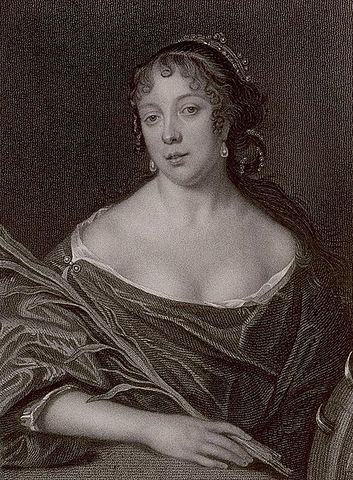
Elisabeth Pepys, c.1666 (1640-69) image via Wikimedia <http://commons.wikimedia.org/wiki/File:Elizabeth_Pepys.jpg>
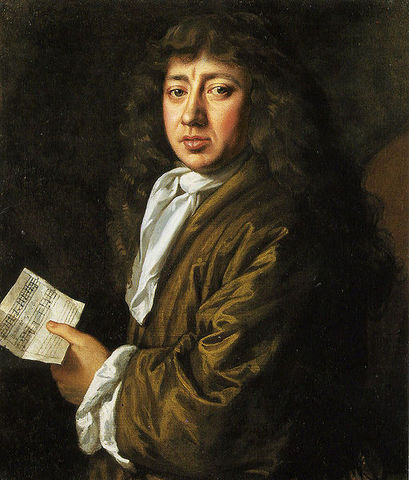
Samuel Pepys, c.1666 (1633-1703) image via Wikipedia <http://en.wikipedia.org/wiki/File:Samuel_Pepys.jpg>
/////////////////
1660年の日記 <http://infomotions.com/etexts/gutenberg/dirs/4/1/2/4125/4125.htm>
1661年の日記 <http://www.gutenberg.org/files/4131/4131-h/4131-h.htm>
"Elizabeth Pepys (wife, b. St Michel)" in The Diary of Samuel Pepys: Dairy entries from the 17th century London diary <http://www.pepysdiary.com/p/150.php>
Hanged, Drawn and Quartered――『あしながおじさん』のなかのサミュエル・ピープス(4) Samuel Pepys in Daddy-Long-Legs (4) [Daddy-Long-Legs]
〔直前の記事「『あしながおじさん』のなかのサミュエル・ピープス(3) Samuel Pepys in Daddy-Long-Legs (3)」の補足的な記事です〕
サミュエル・ピープスの日記におけるトマス・ハリソンの処刑目撃のくだりは有名で、英語のウィキペディアの "Thomas Harrison" にもピープスが言及され、また、ピープスの言葉に由来するパブが紹介されています。――
Samuel Pepys wrote an eyewitness account of the execution at Charing Cross, in which Major General Harrison was dryly reported to be "looking as cheerful as any man could do in that condition". This account is also quoted on a large plaque on the wall of the Hung, Drawn and Quartered public house near Pepys Street, where the diarist lived and worked in the Navy Office. In his final moments, as he was being led up the platform, the hang-man asked for his forgiveness. Upon hearing his request Thomas Harrison replied, "I do forgive thee with all my heart... Alas poor man, thou doith it ignorantly, the Lord grant that this sin may be laid to thy charge." Thomas Harrison then gave all of the money that remained in his pockets to his executioner and was thereafter executed. [“Thomas Harrison,” Wikipedia <http://en.wikipedia.org/wiki/Thomas_Harrison_(soldier) >]
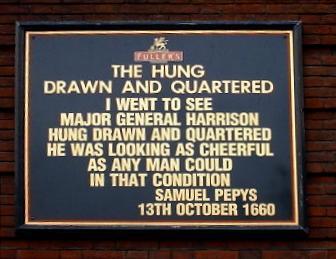
image via Wikipedia <http://en.wikipedia.org/wiki/File:Hdq.png>
ピープス・ストリートのパブ "The Hung Drawn and Quartered" の plaque (看板)にはジュディーが引いているのと同じ箇所が引かれています。が、ちょっとまた英語が編集されているようです。
ピープスの日記原文――"I went out to Charing Cross, to see Major-general Harrison hanged, drawn; and quartered; which was done there, he looking as cheerful as any man could do in that condition."
ジュディーの手紙――"I went [out] to Charing Cross to see Major Harrison hanged, drawn and quartered: he looking as cheerful as any man could do in that condition."
看板――"I went to see Major General Harrison hung drawn and quartered /He was looking as cheerful as any man could in that condition"
ところで、ピープスの日記のつづく一文、"He was presently cut down, and his head and heart shown to the people, at which there was great shouts of joy." (彼はまもなく(絞首のロープを切って)降ろされ、首と心臓とが人々に示され、大きな歓喜の叫びがあがった)を昨日の夜読んで、眠っている間に自分の間違いに気づきました。 "cut down" は「切り刻まれ」ではないような気がしますが、行なわれていることは死体の切断であることは確かです。で、 "drawn" の意味を、辞書でいうと「《史》(罪人を)すのこそり(hurdle) などに載せて刑場に引いていく」という、我が国の「引き回し」みたいに考えていたのですが、それだと時間の順序があいません。となると、「引き抜く」「抜き取る」のほうのdraw で、リーダーズ英和辞典だと「〈鳥など〉のはらわたを抜く」というのと類推的に、内臓を抜くことかな、と。
オックスフォード英語辞典を見ます。「引き回し」については4番の "To drag (a criminal) at a horse's tail, or on a hurdle or the like, to the place of execution; formerly a legal unishment of high treason." とあるものです。1568年の用例――"Because he came of the bloud royal.. he was not drawne, but was set upon an horse, and so brought to the place of execution, and there hanged." 王家の血筋(bloud royal) なので "draw" はされず馬に乗せられて処刑場まで行き、そこで絞首された、ということです。1769年の用例――"That the offender [in cases of high treason] be drawn to the gallows, and not be carried or walk." 大罪の場合には罪人は絞首台まで "draw" される、ということです。そして1890年の用例(伝記辞典の記載)――"[Garnett] was sentenced to be drawn, hanged, disembowelled, and quartered." ガーネットさんの刑は、"draw" そして"hang" そして "disembowel" そして "quarter" という内容です。
この最後の用例のなかの "disembowel(led)" というのが「はらわたを抜き出す」「腹を裂く」という意味であって、draw はやっぱり「引き回し」ですねー。
そうして、「わたぬき」のほうのdraw は50番に出てきます。――
To draw out the viscera or intestines of; to disembowel (a fowl, etc. before cooking, a traitor or other criminal after hanging). 〔内臓や腸を抜き取る;はらわたを抜き出す(disembowel) (調理の前に家禽など、絞首のあとに謀反人や罪人を)
そして、この定義には、腑に落ちる説明がポイントを落として添えられているのでした。――
In many cases of executions it is uncertain whether this, or sense 4, is meant. The presumption is that where drawn is mentioned after hanged, the sense is as here.〔処刑の多くの事例で、この意味か、あるいは4番の意味なのか、確かでない。絞首 (hanged)のあとに drawn が言及されているならば、この意味であると推定される〕
なるほどね。
ということで hanged, drawn, and quartered は絞首、臓物引き抜き、四つ裂き、でした。翻訳を見たら、drawn を訳し落としているものもあるけれど、遠藤寿子も厨川圭子も、臓腑を引き抜く、とちゃんと訳しておりました。失礼。
あら、ウィキペディアの Thomas Harrison を読み直していたら、"hanged, drawn and quarterd" のフレーズが青くなってリンクがありました。げげげー。項目が立っています。 "Hanged, drawn and quartered" <http://en.wikipedia.org/wiki/Hanged,_drawn_and_quartered> 。しかも日本語のウィキペディアにも「首吊り・内臓抉り・四つ裂きの刑」として対応記事がありました。失礼。
なお、英語のほうには免責的な注記はありませんが、日本語のほうは「この項目には暴力的または猟奇的な記述・表現が含まれています。」と冒頭に掲げられているので、よい子は見ないほうがいいです。
しかし、自分は読んでたいへん腑に落ちました。英語のほうには、ここでもまたパブのプラックとピープスの日記が合わせて引用されています。
なお、トマス・ハリソンは国王チャールズ1世の処刑執行令状に署名したひとりで、それによってあとから王政復古後に、"regicide" (国王殺し; 弑逆罪,大逆罪)に問われたのです。英国史で大文字で the Regicides というとチャールズ1世を死刑に処した高等法院判事たちのことを指すのだそうです。フランス史だとルイ16世を死刑に処した国民公会のメンバーたち。
楽園の他所者 Stranger in Paradise [歌・詩 ]
煉獄や天使について考えていたのと、歌詞に出てくる "hang suspended" がサミュエル・ピープスの日記の処刑の記述と不気味に響きあったせいかわかりませんがw、トニー・ベネットの歌唱で有名な "Stranger in Paradise" を聞いています。
ギリシアのピアニストの chopenistis さんの投稿映像(歌は Vasiliki Bratsou さん)――
"Stranger in paradise (Kismet)" (2:00): "Δημοτικό Ωδείο Καβάλας 12/6/09
Συναυλία της τάξης μονωδίας της καθηγήτριας Μαρίας Καρατζά με τίτλο
"Τραγούδια Που Αγαπήθηκαν Μέσα Από Τα Musical"
Music: George Forrest
Lyrics: Robert Wright
Φωνή: Βασιλική Μπράτσου
Πιάνο: Λευτέρης Μισιργής
Κάμερα: Στέλα Μισιργή
Voice: Vasiliki Bratsou
Piano: Lefteris Misirgis
Camera: Stela Misirgi"
"Kismet" というのは1953年ロサンゼルス初演のミュージカルのタイトルです。1911年にロンドンで初演された Edward Knoblock (Edward Gustav Knoblauch, 1874-1945) の芝居 Kismet: An "Arabian Night" in Three Acts を、Alexander Borodin の曲を使って Robert Wright (1914- ) と George Forrest (1915-99) のコンビが詞をつけてミュージカル化し、それがさらに映画化もされました。
エドワード・ノブロックというのはニューヨーク市生まれのドイツ系移民ですが、イギリスに帰化したので、英国の劇作家・小説家とされているようです。Kismet (キズメットあるいはキスメット)というのは、Fate とか Destiny を意味するアラビア語に由来するトルコ語・ウルドゥー語だそうで、辞書には《イスラム》アッラーの意志;運命,天命,宿命 などと書いてあります。
ロシア五人組のひとりであったアレクサンドル・ボロディン (1833-87)の『イーゴリ公』(1869- 未完; 没後1890完成 Prince Igor )におさめられた「韃靼人の踊り」が "Stranger in Paradise" の音楽です。(『イーゴリ公』の映像(訳詩つき)はこちら <http://www.youtube.com/watch?v=ChoRfYn5qP4>)。ボロディンは東スラヴの叙事詩『イーゴリ戦記』をもとにしたのだそうです。ということでアラブやスラヴやアジアやヨーロッパが、東方と西方が、混交して現代にまで至っているのかなあ、としじみ、いやしみじみするクリスマスの日。
"Stranger in Paradise"
Take my hand,
I'm a stranger in paradise,
All lost in a wonderland,
A stranger in paradise.
If I stand starry-eyed,
That's a danger in paradise,
For mortals who stand beside
An angel like you.
I saw your face
And I ascended
Out of the commonplace
Into the rare!
Somewhere in space
I hang suspended
Until I know
There's a chance that you care.
Won't you answer the fervent prayer
Of a stranger in paradise?
Don't send me in dark despair
From all that I hunger for,
But open your angel's arms
To the stranger in paradise
And tell him that he need be
A stranger no more.
(私の手を取ってください
私は楽園の他所者
不思議の国ですっかり迷子になった
楽園の他所者。
もしも私が夢見るようなまなざしをしているなら
楽園でそれは危険なこと
あなたのような天使のかたわらに
人間が立っていることは。
私はあなたの顔を見
そして私は上へ昇りました
平凡な世界を抜けて
稀有な場所へと!
宇宙のどこかで
私は宙吊りになっています
あなたが好いてくれる運があると
私が知るまでは。
楽園の他所者の
熱い祈りに答えてくれませんか?
私が渇望するすべてから
暗い絶望へと送らないで
あなたの天使の腕を広げてください
楽園の他所者に
そして彼に告げてください
もう楽園の他所者ではないと。)
"starry-eyed" は文字通りには「星のような目をした」ですけれど、idealistic とか romantic とかさらには naive とかいう意味で、OED を見るとマーガレット・ミッチェルの『風と共に去りぬ』の24章がいちおう初例となっています(いちおう、というのは "starry-eyed という言葉自体は2番の「転義」「比喩」のほうにいちおう1928年の "starry-eyed sympathy" というのがカッコつき――不確実という含み――だけど挙がっているからです)――"She had never stood starry-eyed when the Stars and Bars ran up a pole." "Somewhere in space I hang suspended" と合わせて考えると、天空の星のイメジなんでしょうか。星になっちゃったのかなあ。いやちがうw。地上のラヴソングですよね。
"Hedy Lamarr (Stranger In Paradise)" (3:16), posted by "Muirmaiden"
////////////////////
2009年12月27日付記
おまけの先に派生した記事――
「"Stranger in Paradise" の不思議な日本語訳 A Stranger Translation of "Stranger in Paradise"」
「ミュージカル『キスメット』のなかの "Stranger in Paradise" "Stranger in Paradise" in the Musical Kismet (1953)」
エドワード・ノブロックの『キスメット』のアメリカ版に記された鉛筆書きから Through Pencil Writing on the American Edition of Edward Knoblock's Kismet [Marginalia 余白に]
前の記事でなんとなくリンクした、1953年のミュージカル『キスメット』のもとになった1911年のエドワード・ノブロックの戯曲ですけれど、Internet Archive には2種4冊の、いずれもアメリカでの出版ですが、E-text がおさめられています。
で、その1冊でカリフォルニア州立大学サンディエゴ校の蔵書らしい、1911年ニューヨークで出版された本は、やたらに書き込みがありました。たとえば30-31ページ。――
Edward Knoblauch [Knoblock], Kismet: An "Arabian Night" in Three Acts (New York: George H. Doran, 1911), 30-31 <http://www.archive.org/stream/kismetanarabiann00knobiala#page/30/mode/2up>
左のページの上のほうには、 "Music 'Turkish Patrol'" と書かれているようです。"The Turkish Patrol" というのは、(Gustav) Theodore Michaelis テオドール・ミヒャエリス(?)という人 (1831-87) の作曲した曲のようです($2.95 の譜面 @FreeHand Music <http://www.freehandmusic.com/search.aspx?all=&title=turkish+patrol,+the>)。で、どうやら芝居上演用のアイデアを入れた書き込みのようなのです。
扉にはふたりの署名がありました。――
Joe S. Bell
March 1915
New York
Geo. E. Lask
Feb. 1921
S[an]. F[rancisco]. Cal[ifornia].
ベルさんはわかりませんが、ラスクさんというのは George E. Lask (1884-1935) という、サンフランシスコ (S. F.) のチャイナタウンで生まれ、サンフランシスコとニューヨークで活躍した舞台演出家だと思われます。1900年にニューヨークでミュージカル Florodora (前年1899年にロンドンで初演)をプロデュースして、6人からなる女性の合唱が、まもなくFlorodora Girls と呼ばれ、アメリカのコーラスガールの先駆となった、とされています。
(ありがちなことではありますが)だいたい背の同じ女性をそろえたのだそうです("each standing five foot four and weighing a uniform 130 pounds" <http://www.musicals101.com/1900to10.htm>)。それも含めて Tiller Girls を思いだしました〔いちおう自分メモ的に、「August 29 ラインダンスとフォークダンス (2) Line Dances and Folk (2)」「August 30 OED のまとめ――ラインダンスとフォークダンス (3) OED, QED: Line Dances and Folk (3)」「August 30 性と肉体的接触――ラインダンスとフォークダンス (4) Gender and Physical Contact: Line Dances and Folk (4)」参照〕。
あれっ。なんの話でしたっけ。
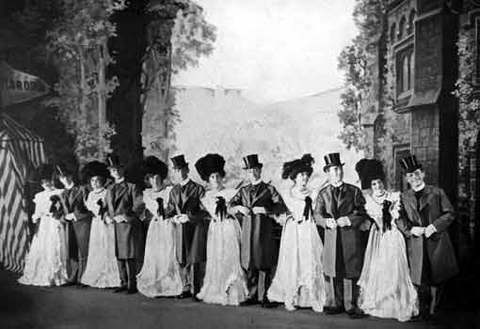
The original Florodora sextet – Daisy Green, Marjorie Relyea, Vaughn Texsmith, Margaret Walker, Agnes Wayburn, and Marie Wils - and their male co-stars
image via "Stage Musicals 1900-1910"
/////////////////////////////////////////
Dancer History Archives by StreetSwing.com - The Florodora Girls <http://www.streetswing.com/histmai2/d2floradora1.htm>
History of The Musical Stage 1900-1910: "Skipping a Beat, Singing a Dream" by John Kenrick <http://www.musicals101.com/1900to10.htm>
George Puttmanによる "The Turkish Patrol" のパイプオルガン演奏 (1928) オーディオ <http://www.archive.org/details/TurkishPatrol1927> 〔Internet Archive; Open Source Audio〕
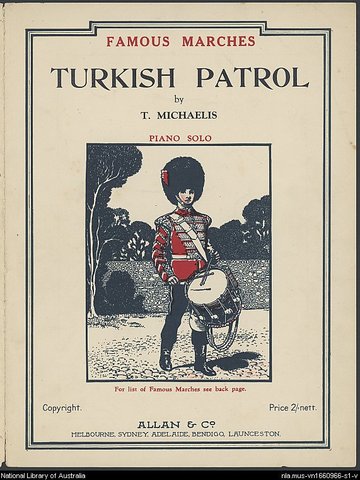
image via "Digital Collections - Music," National Library of Australia <http://nla.gov.au/nla.mus-vn1660966>
"Stranger in Paradise" の不思議な日本語訳 A Stranger Translation of "Stranger in Paradise" [歌・詩 ]
ああ、なぜ、葉を行う Oh why do the leaves
桑の木の Of the Mulberry tree
ささやく異なる今 Whisper differently now
そしてなぜナイチンゲールが歌っている And why is the nightingale singing
桑の弓の正午に At noon on the Mulberry bow
いくつかの最も神秘的な理由 For some most mysterious reason
これは私が知っている庭園ではない This isn't the garden I know
いいえ、楽園の現在の No it's paradise now
これだけの庭された That was only a garden
たった今 A moment ago
彼: He
私の手をください Take my hand
天国で見知らぬ人によ I'm a stranger in paradise
全ての不思議の国では失わ All lost in a wonderland
楽園の見知らぬ人 A stranger in paradise
もし私が星空スタンドアロン目 If I stand starry-eyed
それは楽園の危険がある That's a danger in paradise
人間は人の脇に立つ For mortals who stand beside
あなたのような天使 An angel like you
私はあなたの顔を見た I saw your face
そして私は昇天 And I ascended
を当たり前の Out of the commonplace
にまれな Into the rare
宇宙のどこかで Somewhere in space
私は中断ハングアップする I hang suspended
まで、私は知っている Until I know
そこには、介護チャンス There's a chance that you care
場合は、熱烈な祈りの答えはしない Won't you answer the fervent prayer
楽園の見知らぬ人の Of a stranger in paradise
暗い絶望の中送ってください Don't send me in dark despair
すべてから、私は飢えて From all that I hunger for
しかし、あなたの天使の腕を開く But open your angel's arms
楽園で見知らぬ人には To the stranger in paradise
と彼に言う And tell him
彼が必要とされる That he need be
見知らぬ人以上 stranger no more
彼女:
私はあなたの顔を見た I saw your face
そして私は昇天 And I ascended
を当たり前の Out of the commonplace
にまれ Into the rare
両方: Both
宇宙のどこかで Somewhere in space
私は中断ハングアップする I hang suspended
彼女:
まで、私は知っている Until I know
彼:
私が知っている瞬間ティル Till the moment I know
彼女:
そこには、介護チャンス There's a chance that you care
彼:
そこには、介護チャンス There's a chance that you care
彼女:
場合は、熱烈な祈りの答えはしない Won't you answer the fervent prayer
楽園の見知らぬ人の Of a stranger in paradise
彼:
暗い絶望の中送ってください Don't send me in dark despair
すべてから、私は飢えて From all that I hunger for
両方:
しかし、あなたの天使の腕を開く But open your angel's arms
楽園で見知らぬ人には To the stranger in paradise
そして、私は可能性があります教えてください And tell me that I may be
見知らぬ人以上。 A stranger no more.
"Thomas Allen/Sarah Fox - Stranger in Paradise" (5:31) posted by "schweitzer006325"
ミュージカル『キスメット』のなかの "Stranger in Paradise" "Stranger in Paradise" in the Musical Kismet (1953) [歌・詩 ]
なんだかカリフォルニア時間に戻ったような気分で、ミュージカルの詩について考えてみます。
いわゆる「スタンダード」と呼ばれる曲がしばしばそうであるように、"Stranger in Paradise" は verse 部と refrain 部をもっていて、verse 部分は元のミュージカルのコンテクストをrefrain 部以上に想起させるものとなっています。もっともverse を読んだからといって物語がすべて凝縮されているはずもなく、非具体性は残ります。それでもrefrain 部だけ独立して読むよりは、よかれあしかれキャラクターたちの関係、そしてラブソングのコンテクスト、は推測されます。それだけ歌(refrain部分)の抽象化の度合いは減るわけです、よかれあしかれ。
と、なんだかわけのわからない前口上はそれくらいにして、とりあえず、「男女」「彼・彼女」に割り振られた詞を見てみます。歌詞を適当に直して、適当にパンクチュエーションを付加しました。(その前のところに、あとから見つかったのですが、日本人によるすてきなパフォーマンスを)――
"『Le Mani』Vol.1 《Kismet》 Stranger in Paradise" (5:06) posted by "LeMani2007" on July 3, 2009: 「Le Mani旗揚げ公演《Kismet》Stranger in Paradise
Piano1.難波益美、2:横田真弓
Vl.松下あすか
Vo.兎束康雄、守谷由香
Arr.内田塊 」
VERSE
She:
Oh why do the leaves ああ、どうしてマルベリーの
Of the mulberry tree 木の葉のささやきは
Whisper differently now? 今は違って聞こえるの?
And why is the nightingale singing そして、ナイチンゲールはなぜ
At noon on the mulberry bough? マルベリーの枝で真昼に歌っているの?
For some most mysterious reason なにかとても神秘的な理由から
This isn't the garden I know. ここは私の知る庭ではなくなっている。
No, it's paradise now. いいえ、いまは楽園なの。
That was only a garden ほんの少し前には
A moment ago. ただの庭だったのに。
REFRAIN
He:
Take my hand, 私の手を取ってください
I'm a stranger in paradise, 楽園では他所者なのです
All lost in a wonderland, 不思議の国ですっかり迷子になった
A stranger in paradise. 私は楽園の他所者なのです。
If I stand starry-eyed, 夢見るような目で立ちつくしていると
That's a danger in paradise, 楽園では危険なこと
For mortals who stand beside あなたのような天使のかたわらに
An angel like you. 生身の人間が立っているのは。
I saw your face 私はあなたの顔を見、
And I ascended 凡庸な世界を抜け出して
Out of the commonplace 私は上へ昇りました
Into the rare! 稀有な場所へと!
Somewhere in space 宇宙のどこかで
I hang suspended 私は宙吊りになっています
Until I know あなたが好いてくれる運命があると
There's a chance that you care. 私が知るまでは。
Won't you answer the fervent prayer 楽園の他所者の
Of a stranger in paradise? 熱い祈りに答えてくれませんか?
Don't send me in dark despair 私が渇望するすべてから
From all that I hunger for, 暗い絶望へと送らないで
But open your angel's arms あなたの天使の腕を広げてください
To the stranger in paradise 楽園の他所者に
And tell him that he need be そして彼に告げてください
A stranger no more 彼はもう楽園の他所者ではないと。
She:
I saw your face
And I ascended
Out of the commonplace
Into the rare!
Both:
Somewhere in space
I hang suspended
She:
Until I know
He:
Till the moment I know
She:
There's a chance that you care.
He:
There's a chance that you care.
She:
Won't you answer the fervent prayer
Of a stranger in paradise?
He:
Don't send me in dark despair
From all that I hunger for,
Both:
But open your angel's arms
To the stranger in paradise
And tell me that I may be そして私に告げてください
A stranger no more. 私はもう楽園の他所者ではないのだと。
庭のなかの二人の男女が、庭の変貌とともに日常性を脱して恋愛の恍惚境に至るおはなし。でしょうかw。 そこは人間性も剥奪されて天使に変容しうるパラダイスなのでした。
しっかし。男も女も同じセリフを言い合うのはなんだかなあ。下の短い映像は、デュエットを含む後半部分です。
"Kismet: Stranger In Paradise" (1:30) posted by scrim808.
さて、ミュージカルの物語を少し導入して、コンテクストをよかれあしかれ構築してみます。
2幕からならミュージカル Kismet (1953) において、"Stranger in Paradise" は、第1幕10曲中の7曲目に出てきます。舞台は千一夜物語のころのバグダッド。売れない詩人Haji は美しい娘のMarsinah を伴って詩を民衆に売ろうとする ("Rhymes Have I") がまったく売れず、バザールのオレンジを盗んでこいと娘は父に言われます。乞食のあいだに入って物乞いを始める詩人をほんとうの乞食たちが非難すると、自分は乞食仲間で行方不明になっているHaji のいとこなのだと詩人は言い訳する。詩人の物乞いは魔術的な言葉の力を持っていて、金が手に入り、詩人は運命をたたえる歌を歌う("Fate")。そのとき砂漠からやってきたHassen-Benが、彼をHaji と思って誘拐します。詩人は山賊のJawan のもとへ連れて行かれますが、そこで、Haji が15年前に呪いをかけたために息子が行方不明になっているJawan の話を聞き、金貨100枚で呪いを解くことを約束します。ううむ。話が長いですね。詰めます。オレンジを盗んだ果物売りから追いかけられたMarsinah ですが、そこへ金をもった父親の詩人が戻ってきて、商人に金を渡し、また大金の半分を娘に与えます。商人がMarsinah を美しく着飾らせます("Baubles, Bangles and Beads" )。そこへお忍びで、街に出ていたカリフがやってきて目を留め、Marsinah に一目ぼれして後をつけます。実は、カリフは借金を返すためにAbabu の王の3人の娘のいずれかと結婚せねばならない羽目におちいっています。Marsinah は美しい庭のある小さな家を見つけて、その家を買って、父と娘で住もうと考えます。Marsinah が庭を賛美しているところへカリフが忍び入り、庭師のふりをして娘に自己紹介します。その場で恋に落ちるふたり("Stranger in Paradise)。ふたりは月の出に庭で会うことを約束して別れます。
と、読んでいただいても、特に歌の理解が深まるわけではないかもしれませんw。逆に言うと、歌は必ずしもミュージカルのプロットに完全にガッチガチに合致していないのではないか。とも思えます。半年以上前に考えて前のブログに書きとめていたことをまた書きとめておきます(ほんとはコピペ)――
ひとつはミュージカルの歌詞について(*)、というか、結局、歌詞について。ほとんど本人ぐらいしか覚えておらないと思うのですけれど、ハナシの元は「おおスザンナ」の歌詞の受容なのですが、いったい歌詞というのは音楽(というより歌曲)にとってどれほど重要なのか、という問題をはらんでいます。書きだしたついでに書いておくと、フォスターはヴァース+リフレイン形式を出して、その後の歌謡曲に先駆けるところあり、だとすれば、ミュージカルにおける歌詞の変奏についても示唆的なものをもったのではないか思われます(たぶん)。「おおスザンナ」の問題には、ミンストレルショーという舞台を離れて曲がひとりだちしたときに、歌詞に何が求められるか、どう理解されるか、ということが含まれていると思われます。既に書いたように、歌詞の3番だかでは話者は自分のことを "this darkie" と呼んでおり、普通には「私」=黒人という歌の物語の世界が追認されるわけですし、この歌の歌詞は一人称の物語を語っていて(まあ、その中に夢の物語も枠として入っているけれど)、だから、簡単に言うと、たいへん特殊な状況を特定の人が歌っているわけです。それを芝居ではなくて(つまりミンストレルで黒人のなりをした白人が演じるのではなくて)日常の空間でふつうの人が歌うときって、どうなるんだろう、という、たいへん素朴といえば素朴な話です。
いっぽう、アイラ・ガーシュウィンは、実は、バラバラの歌曲の寄せ集めではなくて、ひとつのミュージカルの物語やプロットに相互に関係づけられた統一のある作詞を行なったほとんど最初の人として位置づけられています(急いで付け加えておきますが、これも既にみたように、ボツになった歌を改編してのちのミュージカルで使用するとかはしょっちゅう行なってはいますけれど、まあ、考えてみれば男女の物語というのがミュージカルであれなんであれ物語の基本だから、愛や恋の歌は再使用可能だし、だからこそ特殊な物語状況があっても他の人に歌われ、かつ共感を呼ぶわけでしょうが)。けれどもアイラ・ガーシュウィンのこの努力は、ひとつの歌の自律性、といったらいいだろうか、をヘタをすると損ないかねないかもしれないですよね。その歌がミュージカルの中で置かれたコンテキストが歌詞の意味を左右するからです。
(*) September 15 アイラ・ガーシュウィンの「ス・ワンダフル」 (1) " 'S Wonderful" by Ira Gershwin (1)にはじまる September 26 アイラ・ガーシュウィンの「ス・ワンダフル」 (1 1/3) " 'S Wonderful" by Ira Gershwin (1 1/3) の3分の1つづきのSeptember 27 アイラ・ガーシュウィンの「ス・ワンダフル」 (1 2/3) " 'S Wonderful" by Ira Gershwin (1 2/3)の3分の1つづきのOctober 3, September 30 アイラ・ガーシュウィンの「ス・ワンダフル」 (2) " 'S Wonderful" by Ira Gershwin (2)のつづきの October 4 ミュージカルの歌詞というもの(上)――アイラ・ガーシュウィンの「ス・ワンダフル」 (3) On Musical Lyrics: " 'S Wonderful" by Ira Gershwin (3) のつづきのOctober 8, 19 『ファニー・フェース』 (1927) のプロット I ――ミュージカルの歌詞というもの(下の1)――アイラ・ガーシュウィンの「ス・ワンダフル」 (4) On Musical Lyrics: " 'S Wonderful" by Ira Gershwin (4)のつづきの October 20 『ファニー・フェース』 (1927) のプロット II ――ミュージカルの歌詞というもの(下の2)――アイラ・ガーシュウィンの「ス・ワンダフル」 (5) On Musical Lyrics: " 'S Wonderful" by Ira Gershwin (5) のつづきのOctober 21 『ファニー・フェース』 (1927) のプロット III ――ミュージカルの歌詞というもの(下の3)――アイラ・ガーシュウィンの「ス・ワンダフル」 (6) On Musical Lyrics: " 'S Wonderful" by Ira Gershwin (6) あたりでとまって、メイポールやルネサンスフェアのほうへ話が広がってしまったのでした。ああ、そうだ。ジェンダー問題が底流としてあったのでした。(「March 28-29 短い文 (ポーの『マージナリア』から) 付 ミュージカルの歌詞についての雑感 [歌・詩]」)
何も思考は進歩しておらない自分がいます。がっくし。ただ個別の事例で反復しているだけですね。デモ人間というのはそういうものなのだという気もします。
この歌についても例の『ジャズ詩大全』(私的情報)におさめられていることを知りました(第2集)。膨大な『大衆音楽徒然帖』はいつのまにかすっかりリンクが切れてしまったみたいで、断片的な引用を引証します――「mirukoの時間 ココログ: STRANGER IN PARADISE」 (2006.2.4)<http://blog.livedoor.jp/miruko1/archives/50159551.html>。主旨のひとつは(村尾陸男の訳にある「旅人」がJRのCM と響きあっているということですが、英語の原詞に別に「旅」の要素はないです。物語のカリフも旅人ではない。けれども、そんなふうに(どんなふうにか)人は歌にいろんなイメジを自由に重ねるものなのでしょう。し、この歌の場合は曲自体が、それこそ「異邦人」的な東西融合ないし東西の境の想像のオリエントみたいなものを喚起して、(『あしながおじさん』の)ジュディーが言うところの wanderthirst を駆り立てるところがあるのやもしれません。
/////////////////////
Le Mani <http://mani.rakurakuhp.net/> 〔Le Mani. 2007年3月に武蔵野音楽大学出身のピアニスト10名が集い結成された〕
Le Mani通信 <http://blog.livedoor.jp/lemani/> 〔Le Maniの情報案内ブログ〕
Handsome Mourning と Some Mourning――『あしながおじさん』のなかのサミュエル・ピープス(5) (Hand)Some Mourning: Samuel Pepys in Daddy-Long-Legs (5) [Daddy-Long-Legs]
Don't be nervous, Daddy―I haven't lost my mind; I'm merely quoting Sam'l Pepys. We're reading him in connection with English History, original sources. Sallie and Julia and I converse now in the language of 1660. Listen to this:
"I went [out] to Charing Cross to see Major Harrison hanged, drawn and quartered: he looking as cheerful as any man could do in that condition." And this: "Dined with my l [←L]ady who is in handsome [←some] mourning for her brother who died yesterday of spotted fever."
(心配なさらないで、ダディー――わたしは気がヘンになってはいません。サミュル・ピープスを引用しているだけです。「英国史」がらみでわたしたちはピープスを読んでいます、原典を。サリーとジュリアとわたしはいま1600年の言葉で会話をしています。聞いてみてください――
「チャリング・クロスに、ハリソン少佐が絞首され引き回され〔臓腑を抜かれ drawn の意味については「Hanged, Drawn and Quartered」で検証しました〕四つ裂きにされるさまを見物に出かけた。彼はかような状況で可能な限り陽気そうに見えた。」 それからこれ――「昨日発疹チフスで死んだ兄のためたっぷり喪に服している夫人と外食をした」) [Penguin Classics 117]この英語は、特に古い文体という感じはしないと思われますし、死を平然と扱うさまに違和感を覚えて引いているのではないかと思われます(がよくわかりません)。
[・・・・・・]
DIARY OF SAMUEL PEPYS.
JULY 1661
3rd. To Westminster to Mr. Edward Montagu about business of my Lord's, and so to the Wardrobe, and there dined with my Lady, who is in some mourning for her brother, Mr. Saml. Crew, who died yesterday of the spotted fever. So home through Duck Lane' to inquire for some Spanish books, but found none that pleased me. So to the office, and that being done to Sir W. Batten's with the Comptroller, where we sat late talking and disputing with Mr. Mills the parson of our parish. This day my Lady Batten and my wife were at the burial of a daughter of Sir John Lawson's, and had rings for themselves and their husbands. Home and to bed.〔「『あしながおじさん』のなかのサミュエル・ピープス(3) Samuel Pepys in Daddy-Long-Legs (3)」〕
自分の前の記事を引用しちゃったりして、父としていや遅々として進みませんがご容赦を。
ジュディーはサミュエル・ピープスの日記原文の "in some mourning for her brother" を"in handsome mourning for her brother" に変更しています。この改変によって何が起こったのか、気になって気になって。
というのも、自分は "some" という、漠然とした量を、"handsome" (=considerable) というたっぷりした量の「喪」に変更したとばかり考えておったのですけれど、『あしながおじさん』の翻訳の多くは、ピープスの奥さんが派手な喪服で着飾っているさま、ととっておるからです。
mourning という言葉は抽象的に「喪」の意味と、具象的に「喪服」の意味があります。 だから、"handsome mourning" というフレーズになったとたんに「喪」ではなくて「喪服」という具体性を帯びて読まれるのは、わかります。以下はなかばひまつぶしに "handsome mourning" の具体例の列挙です。個人的には葬式・埋葬関係の歴史への興味をひきずっており。
.jpg)
1860年代の喪服 image via 19th Century Mourning Clothing <http://19thcenturyartofmourning.com/19th_century_mourning_clothing.htm>
(1) イギリスの女性作家 Elizabeth Gaskell (1810-65) の小説 Ruth (1853) の第36章 "The End"――
Mrs. Farquhar had comforted the bitterness of Sally's grief by giving her very handsome mourning. At any rate, she felt oddly proud and exulting when she thought of her new black gown; but, when she remembered why she wore it, she scolded herself pretty sharply for her satisfaction, and took to crying afresh with redoubled vigour. She spent the Sunday morning in alternately smoothing down her skirts and adjusting her broad hemmed collar, or bemoaning the occasion with tearful earnestness. But the sorrow overcame the little quaint vanity of her heart, as she saw troop after troop of humbly-dressed mourners pass by into the old chapel. They were very poor--but each had mounted some rusty piece of crape, or some faded black ribbon. The old came halting and slow--the mothers carried their quiet, awe-struck babes. <http://books.google.co.jp/books?id=2PZxjZYnNQUC&pg=PT296&lpg=PT296&dq=%22handsome+mourning%22&source=bl&ots=gXtlbYyUPv&sig=ZCJQXHwZdohieVBW7xpUBenTGDs&hl=ja&ei=4642S9WLI43e7AOXxeD2CQ&sa=X&oi=book_result&ct=result&resnum=8&ved=0CC4Q6AEwBw#v=onepage&q=%22handsome%20mourning%22&f=false>
ファーカー夫人 (Mrs. Farquhar) の新調の黒のガウンは、粗末ななりをした貧しい弔問者たちの 一団 (troop after troop of humbly-dressed mourners) と対比されていて、 "handsome mourning" は、やはり喪服の立派さにかかわるのでしょうか。あ、つうか、giving とあるので、サリーに与えた喪服が mourning ですか。ですね。
(2) イギリスの女性児童作家 Charlotte Yonge (1823-1901) のThe Two Sides of the Shield の第6章 "Persecution"――
Nor had her [Dolores'] handsome mourning been taken from her and old clothes of her cousin substituted for it. No, but she had been cruelly pulled about between Mrs. Halfpenny and the Silverton dressmaker with a mouthful of pins; and Aunt Lily had insisted on her dress being trimmed with velvet, instead of the jingling jet she preferred. <http://www.archive.org/stream/twosidesofshield00yonguoft#page/86/mode/2up/search/mourning>
いとこの古着に替えられなかった "it" が handsome mourning なので、明らかに喪服の意味です。
(3) 1802年Mount Vernon のMartha Washington という女性がしたためた遺言状――
Item it is my will and desire that Anna Maria Washington the daughter of my niece be put into handsome mourning at my death at the expense of my estate and I bequeath to her ten guineas to buy a ring. (一つ。私の姪の娘アンナ・マライア・ワシントンが私の死に際して私の遺産からの出費により "handsome mourning" に服せるよう希望し遺言する。また、指輪を一個買うために10ギニーを遺贈する。) <http://www.fairfaxcounty.gov/courts/circuit/pdf/mwtranscript.pdf>
「服せる」と訳しましたが "put into" は「着せる」の意味でやっぱり服なんでしょうか。指輪は喪とは別件なのか不明。
(4) Romance Readers and Romance Writers: A Satirical Novel (BY THE AUTHOR OF ‘A PRIVATE HISTORY OF THE COURT OF ENGLAND, &C.’) (London, 1810) の第16章 "New Character" ――
She was immediately put in possession of a beautifully decorated dressing-room and bed-chamber, which, with all her native sweetness and polish of manners, Mrs. Davenport desired her, while she gave her at the same time a kind embrace, to consider her own.
Margaret had been put into very handsome mourning for her uncle, at Mrs. Davenport’s expence: she was now in a fine black cloth riding-habit, and being in sables, her dress she knew would be soon adjusted for their seven o’clock dinner, and throwing off her hat, she sat down on a superb sofa-bed, to admire all around her, and feast her eyes with the beauty of that apartment, which she had been told to consider as her own.
The beautifully devised little fire-screens, the emigrant bellows, and the portable book-cases, all shewed the opulence of their possessors, and the elaborate skill of the artist; they were not only tasteful trifles, they were costly; of the most expensive materials, and of the choicest and most difficult to be obtained foreign wood that could be purchased. <http://www.chawton.org/library/novels/files/Romance2.html>
このロマンス批判ノヴェルに出てくる "handsome mourning" は前置詞 for と一緒になっているのですけれど、服なのでしょうね。ダヴェンポート夫人がお金を出してくれて、おじさんのための喪服を身につけたという。
(5) Recollections of a French Marchioness (London, 1846) 第7章――
She preceded us as far as a sort of throne-room filled with ecuyers, pages, and other gentlemen belonging to her, all dressed in handsome mourning, as well as their mistress, on account of the King's death; for the innovations of the Duchesse de Berry had not penetrated the gilded and emblazoned gratings of the Hotel de Lesdiguieres. <http://www.archive.org/stream/recollectionsoff01londiala/recollectionsoff01londiala_djvu.txt>
やっぱり服なのかしら。
(6) Charlotte M. Brame (Charlotte Monica), 1836-1884 の Dora Thorne 第19章――
[. . .] She wrote to the Elms, telling Dora of her husband's death, and announcing her own coming; then the little household understood that their quiet and solitude had ended forever.
The first thing was to provide handsome mourning. Dora was strangely quiet and sad through it all. The girls asked a hundred questions about their father, whom they longed to see. They knew he had left home in consequence of some quarrel with his father--so much Lady Earle told them--but they never dreamed that his marriage had caused the fatal disagreement; they never knew that, for their mother's sake, Lady Earle carefully concealed all knowledge of it from them. <http://www.sveninho.com/book/1871137/Dora-Thorne/num_218.html>
(7) Hesba Stretton の小説 Carola 第4章 "The Book and Its Captive"――
"You ought to go to your parish priest," the chaplain at the cemetery had said to her; he who had given her the book. This she would do at once; and in eager haste she dressed herself in the handsome mourning she had not worn since the day of the funeral. She descended the ladder into the room, where Matthias was ceremoniously washing his hands up to the elbow, before sitting down to the frugal supper. Her face was pale, but her dark eyes shone with suppressed excitement. <http://www3.shropshire-cc.gov.uk/etexts/E000423.htm>
この一節では、めずらしく冠詞 the がくっついていて(「葬儀の日から着ていなかった」という限定が関係代名詞(省略)節で就職修飾〔2010.11.29訂正〕されて限定されているからです)、"dressed" や "worn" という動詞とのつながりもあるし、ああ、やっぱり服なのね、と納得します。
(8) ヨークシアの女性の1824年9月の記述――
from Celebrating women's history [From History to Her Story: Yorkshire Women's Lives On-Line, 1100 to the Present]<http://www.historytoherstory.org.uk/article_pdf/42.pdf?PHPSESSID=40ebb91ee76dd8398f57769b18be3c6e>
この文章は読みにくくてよくわからないのですけれど、"all the English were in handsome mourning" とされているけれど、Sorteval氏が実際に言ったのは "all the English were in mourning" だった、ということです。ここにおける "mourning" は、喪服ではなくて「喪」の意味なのでしょうか?
(ようやく)ひるがえって、ピープスの日記の原文の "in some mourning for his brother" のmourning は服の意味なのでしょうか? 喪服の場合に "some" というのはなんだかヘンです(とモーリちゃんの父には最初から思われたわけです)。もっとも「ちょっとした」とか「けっこうな」みたいな、informal な "some" というのもありますけれども。
ともあれ、ジュディー=ジーン・ウェブスターは、"some mourning" を "handsome mourning" とおちゃめに変更することによって、「喪」の抽象的・精神的意味から、喪服の立派さ・派手さという具象的な意味に変化させてしまったらしいことはいちおう納得した次第です。
(ついでながら、「"dined with" 誰々」、というより、"dined with my Lady" という文はピープスの日記に頻出する記述であり、特に盛大な晩餐とかいう含みはまったくないでしょう。それでも、『あしながおじさん』のコンテクストを忖度して、少し色をつける必要を感じたので、日記の内容にしたがって、「外食」という言葉にしましたけれど。だから、日記原文は、ルースに書き記した情報なのであって、少なくともピープス自身に「食事」と「喪」をなんらかの意味をもって結びつける意図はまったくなかったと思われます。)
そして、そのことは、外見(衣装)は嘆いていても、内面はそうでもなく、だから、がっつり飯を食う、という外と内の違和、それと冒頭に書いたような、昔の死生観の現代との違和、みたいなことが頭の中にあったのかもしれません。もっとも、前者については、そう考えると、トマス・ハリソンについては、もう一回ねじれて、鷹揚とした態度の裏側に別のものが隠されているということになって、ぐるぐるぐるぐる頭が回ってしまいそうですけれどw。いや、そうではなくて、やはり死を cheerful に捉えるという一点ですかね。
以下ただのメモ・・・・・・
アメリカの女性作家Mary Wilkins Freeman (1852-1930) の By the Light of the Soul 第27章――
Ida had obtained a very handsome mourning wardrobe for both herself and Evelyn, and had superintended Maria's. Maria paid for her clothes out of her small earnings, however. Ida had her dress-maker's bill made out separately, and gave it to her. Maria calculated that she would have just about enough to pay her fare back to Amity without touching that sacred blood-money in the
savings-bank. <http://www.bookpages.org.ua/book/2953521/By-the-Light-of-the-Soul-A-Novel/num_417.html>
この不定冠詞の a の付加は、mourning を形容詞として wardrobe という可算名詞が用いられたことにより出現したものと思われます(つまり名詞の mourning はuncountable――喪服でも、なの?)。
2009年12月28日付記
my Lady をとりちがえていたことに気づきました。人妻でした。恥ずかしいです。
//////////////////////////////
Elizabeth Gaskell, Ruth E-text at Guteberg <http://ia301536.us.archive.org/0/items/ruth04275gut/gruth11.txt>
Charlotte Mary Yonge, The Two Sides of the Shield E-text at Gutenberg <http://www.gutenberg.org/dirs/etext04/twsss10h.htm>
"The Author of 'A Private History of the Court of England, &c.", Romance Readers and Romance Writers: A Satirical Novel (London, 1810) E-text <http://www.chawton.org/library/novels/files/Romance2.html>
"19th Century Mourning Clothing" <http://19thcenturyartofmourning.com/19th_century_mourning_clothing.htm> 〔19th Century Art of Mourning <http://19thcenturyartofmourning.com/index.htm>〕
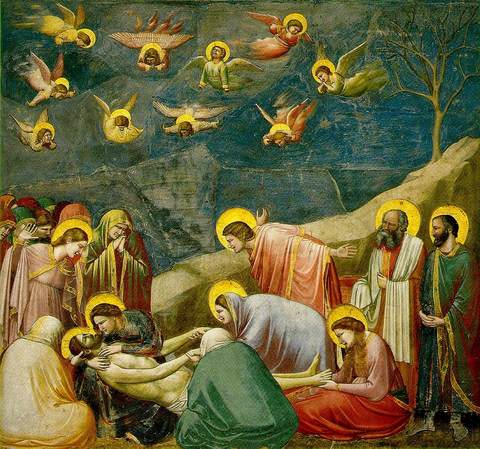
Giotto, The Mourning of Christ (c.1305) image via Web Museum, Paris <http://www.dl.ket.org/webmuseum/wm/paint/auth/giotto/mourning-christ/index.htm>
ジェマイマとサミュエル姉弟 Jemima Montagu and Samuel Crewe [Marginalia 余白に]
前のいくつかの記事を訂正したのですけれど、1661年7月3日にピープスが晩御飯をご一緒する奥様は自分の奥様ではなくて人の奥様でした。
DIARY OF SAMUEL PEPYS.
JULY 1661
3rd. To Westminster to Mr. Edward Montagu about business of my Lord's, and so to the Wardrobe, and there dined with my Lady, who is in some mourning for her brother, Mr. Saml. Crew, who died yesterday of the spotted fever. So home through Duck Lane' to inquire for some Spanish books, but found none that pleased me. So to the office, and that being done to Sir W. Batten's with the Comptroller, where we sat late talking and disputing with Mr. Mills the parson of our parish. This day my Lady Batten and my wife were at the burial of a daughter of Sir John Lawson's, and had rings for themselves and their husbands. Home and to bed. <http://www.gutenberg.org/files/4131/4131-h/4131-h.htm>(下線・太字部分は『あしながおじさん』の4年生2月15日の手紙で引用されている箇所)
ウェストミンスターに行って Edward Montagu と会った、その奥様がmy Lady です。ここでMr. エドワード・モンタギュー Edward Montagu (27 July 1625 – 28 May 1672) はサミュエル・ピープスの父親のいとこにあたる人で、のちにサンドイッチ伯爵になる人――Wikipedia "Edward Montagu, 1st Earl of Sandwich" 参照。

Edward Montagu (1625-72) by Peter Lely
1642年11月7日に同い年の Jemima Crew(e) と17歳で結婚します。Jemima はJohn Crew(e) (1598 -12 December 1679) の娘。ジョン・クルーは1661年4月に王政復古における功績により"Baron Crew of Stene " の称号を与えられ、やがて政界を引退しますが、金持ちで邸宅に人を呼んで歓待したらしい。娘のJemima [Jemimah, Jamima] (1625-74) は1642年に Edward Montagu と結婚して、10人か11人の子供を産みます。
サミュエル・ピープス(23 February 1633 – 26 May 1703) は親戚である Edward Montagu に雇われ、モンタギューの推挙により海軍省の長官の職に就くわけでした。
WEB サイト The Diary of Samuel Pepys: Daily entries from the 17th century London diary は、いろいろな情報を盛りこんでいて、ちょっと驚倒しそうなくらい(日記へのreferences など)なのですが、Encyclopedia の People のなかの "Jemima Mountagu ("my Lady," Countess of Sandwich)" の項目は、いろんな人による書き込み (discussion) もあって、以下のような情報も得られました。――ピープスは8つほど年上で日記執筆時には8人の子持ちであった Jemima を慕っていたけれど、そもそも1643年ごろ(ピープス10歳、ジェマイマ18歳)には知り合いであったらしいこと、ジェマイマはピープスを家族のひとりのように考えて、子供の世話を任せたり金を借りたり、信頼が篤かったこと、またピープスのほうは理想の女性としてジェマイマを捉えていたこと。
.jpg)
Jemima Montagu (1625-74) (18世紀の肖像) © National Portrait Gallery, London
image via National Portrait Gallery - Person - Jemimah (Crew), Countess of Sandwich <http://www.npg.org.uk/collections/search/person.php?LinkID=mp53357>
1661年に spotted fever で亡くなる弟の Samuel について Encyclopedia はそれほど詳しい 情報を与えてくれていません(Wednesday 3 July 1661 の注釈は豊富ですが)。1658年にオックスフォード大学でMA を取った神学者で、1661年未婚で亡くなったことくらいです。生年も書かれておらず(ちなみに彼はウィキペディア記事の"John Crew" の子供のなかにも入っておらず)。
それでも、検索をしつづけたら、肖像が見つかりました。エドワード・モンタギューの肖像を描いたのと同じJohn Lely の筆です――
.jpg)
image via Weiss Gallery <http://www.weissgallery.com/Sir-Peter-Lely-1618-1680-Samuel-Crew-1660-DesktopDefault.aspx?tabid=52&tabindex=51&objectid=171660&categoryid=2636>
Samuel Crew (?? - 1660) と、没年を間違えているところがあやしいかなしいですけれど。
Oil on canvas: 30 x 25 in. (76.2 x 63.5 cm)
Signed with monogram 'PL' (lower left)
Painted circa 1650-52
あと、あれこれ書かれているなかで、サミュエル本人に関わるのは以下のところでしょうか。――
The sitter is an adolescent Samuel Crew, a member of a gentry family from Northamptonshire, who were to commission a number of family portraits from Lely during the 1650s. His parents were John Crew of Stene (1598-1670), M.P. and Speaker of the House of Commons (1623-5) and Jemima Waldegrave (1602-1675), the daughter and co-heir of Edward Waldegrave, of Lawford Hall, Essex. Little is know[n] about his life except that, as with his elder brother Nathaniel (1633-1721), Samuel chose an ecclesiastical life, becoming a reverend of the Protestant clergy.
兄のナサニエル(この人は教会のビショップになっています)と同様に牧師職を志したと。これを信じれば1633年以降の生まれで、Jemima の弟ということになります。
とりあえずよかった、よかった。
ところが、もう一枚、今度はナサニエルの肖像が見つかってしまいました。――

image via Christie's <http://www.christies.com/lotfinder/lot_details.aspx?intObjectID=5159374>
やっぱりJohn Lely の作品。
Lot DescriptionSir Peter Lely (Westphalia 1618-1680 London)
Portrait of Nathaniel, 3rd Baron Crew of Stene, later Lord Bishop of Durham, when a young man, half-length, in a slashed black doublet and a lawn collar
signed with monogram 'PL' (lower left)
oil on canvas
30 x 25 in. (76.2 x 63.5 cm.)
in a carved and gilded frame
ナサニエルは2rd Baron になった兄の John Crew (父親と同名)に子ができなかったので、かわって 3rd Baron になったことはWikipedia に書かれています。けど。
どういうことでしょうか??????
ということで、肖像はどちらのものか不明です。
一方、さらに調査を続けているうちに、家系図を詳しく書いているサイト "Descendants of Johannes Crew de Nantwiche" にサミュエルの記載を見つけました。このページのGeneration No. 5――
Children of JOHN CREWE and JEMINA WALDEGRAVE are:21. i. THOMAS6 CREWE, b. 1624; d. 1697.
22. iii. EDWARD CREWE, b. Abt. 1630; d. 1680.
iv. SAMUEL CREWE, b. Abt. 1632; d. 1661.
23. v. WALGRAVE CREWE, b. 1637; d. 1673.
vi. ANNE CREWE, b. Abt. 1640; d. September 27, 1708; m. (1) SIR HENRY WRIGHT; d. February 05, 1662/63; m. (2) EDMUND PYE.
vii. NATHANIEL CREWE, b. January 31, 1632/33; d. September 18, 1721; m. (1) PENELOPE FROWDE, December 21, 1691; b. 1656; d. March 09, 1698/99; m. (2) DORTHY FOSTER, July 23, 1700; b. 1673; d. October 16, 1715.
viii. JEMIMA CREWE, b. July 17, 1625; d. 1674; m. SIR EDWARD MONTAGU, November 07, 1642; b. July 27, 1625; d. May 28, 1672.
More About SIR EDWARD MONTAGU:
Occupation: 1st Earl os Sandwich
iv. の Samuel Crewe, b. Abt. 1632; d. 1661 です。"Abt" は "about" で、アバウトに1632年ごろということですが、これは vii. のNathaniel Crewe の生まれた1632/33年の1月31日とシンクロしています(つうか、ナサニエルのほうが elder だという上の Weiss Gallery の記述が正しければ、サミュエルのほうが早く生まれるということはありえず・・・・・・双子だったんでしょうか?
画家のJohn Lely は二人の同じ絵を描いたとか(w)
////////////////////////////////
"Edward Montagu, 1st Earl of Sandwich" Wikipedia <http://en.wikipedia.org/wiki/Edward_Montagu,_1st_Earl_of_Sandwich>
"Jemima Mountagu ("my Lady," Countess of Sandwich)" <http://www.pepysdiary.com/p/115.php#discussion> 〔Encyclopedia, The Diary of Samuel Pepys: Daily entries from the 17th century London diary〕
"Samuel Crew (Pepys' Diary" <http://www.pepysdiary.com/p/2765.php>
"Descendants of Johannes Crew de Nantwiche" <http://crewfamily.com/descendants_of_ramulphus_crewe.htm> 〔他にない詳しい情報があります〕
"The Weiss Gallery - Object Detail - Samuel Crew (?? - 1660) - Sir Peter Lely (1618-1680) <http://www.weissgallery.com/Sir-Peter-Lely-1618-1680-Samuel-Crew-1660-DesktopDefault.aspx?tabid=52&tabindex=51&objectid=171660&categoryid=2636> 〔The Weiss Gallery Current Collection 〕
"Sir Peter Lely (Westphalia 1618-1680 London) | Portrait of Nathaniel, 3rd Baron Crew of Sterne" <http://www.christies.com/lotfinder/lot_details.aspx?intObjectID=5159374> 〔Samuel ではなくてNathaniel の肖像としている Christie's〕
サミュエル・ピープスの1660年の日記 <http://infomotions.com/etexts/gutenberg/dirs/4/1/2/4125/4125.htm>
サミュエル・ピープスの1661年の日記 <http://www.gutenberg.org/files/4131/4131-h/4131-h.htm>
人をもてなす――『あしながおじさん』のなかのサミュエル・ピープス(6) Entertaining: Samuel Pepys in Daddy-Long-Legs (6) [Daddy-Long-Legs]
まっこと遅々とした歩みです。
実のところ、『あしながおじさん』の続く一文 ("Seems a little early to commence entertaining, doesn't it?") も意味が定かではなく、わざと以前の引用に含めておらなんだのでした。
しかし、さきほど(昨日)の記事「ジェマイマとサミュエル姉弟 Jemima Montagu and Samuel Crewe」で書いたように自分のすごい勘違いがわかったので、わかったような気になっています。実は下の翻訳の抜き書きはわかるまえに書きとめていたので、わかったあとからだとなかば徒労だとわかりましたし、取ろうかとも思ったのですけれど、なにかの参考にとそのままにしておきます。
[. . .] "Dined with my lady who is in handsome mourning
for her brother who died yesterday of spotted fever."
Seems a little early to commence entertaining, doesn't it? [Penguin Classics 117]
いちばんきっぱりとした訳は松本恵子(新潮文庫)かもしれません――
「余は奥方様のご招待にあずかり、晩餐を共にいたしたが、奥方様は弟君が昨日脳脊髄炎にて逝去されたので、いとも美々しき喪服を召しておいであった」
弟が昨日死んだ今日お客をするなんて、少し早すぎるんじゃございませんかしら? (183)
遠藤寿子(岩波文庫)の訳――
「奥方のお召しにてごちそうになりぬ。奥方は、きのう脳脊髄膜炎にてみまかられし弟君のために、美しき喪服を召したまえり。」
喪中なのにお客様を招ぶなんて、少し早過ぎますわね。 (244-5)
谷口由美子(岩波少年文庫)の訳――
「奥方のお召しで、晩餐を共にせり。弟君が昨日、髄膜炎で亡くなられたため、美しい喪服を召したまえり。」
人を呼んで食事だなんて、少し早すぎませんか? (249-50)
厨川圭子(角川文庫)の訳――
「拙者が晩餐の相伴にあずかりたる姫君は、昨日、脳脊髄膜炎にてみまかりし兄君のために、いとも美わしき喪服を召しておられた」
それじゃ、まだ楽しむには早すぎるじゃありませんか、ねえ? (185)
坪井郁美(福音館古典童話シリーズ)訳――
「美しき喪服に身をつつみしわが奥方とともに晩餐を囲みたり。喪は昨日はっしんチフスで死亡せし奥方の弟君のためなり。」
宴をはるにはちょっとばかり早すぎるんじゃないかしら? (217)
曾野綾子(講談社青い鳥文庫)訳・白木茂(正進社名作文庫)訳――割愛部分。
早川麻百合(金の星社世界の名作ライブラリー)訳――
「奥方さまよりご招待にあずかり、晩さんをともにす。奥方、いと美しき喪服をめしたまいぬ。聞けば、弟君が昨日、脳脊髄膜炎にてみまかられた由。」
弟さんが亡くなった翌日に晩さんをもよおすなんて、ちょっと早すぎると思いません? (278)
岡上鈴江(春陽堂くれよん文庫)訳――
「余は、貴婦人のご招待にあずかり、晩餐を共にせしが、婦人は弟君を昨日、脳脊髄炎にて失いしため、美しき喪服姿でいられた」
それじゃ人をもてなすにはまだ早すぎるじゃありませんか。ねえ? (243)
野上彰(ポプラ社世界の名著)訳――
「奥方と食事をともにせり。きのう、弟ぎみの点状熱(脳せきずいまく炎)にてみまかりたまいしとて、うるわしき喪服を召されたり。」
昨日弟が死んだのなら、お客を呼んで楽しむのは、少し早すぎるんじゃないでしょうか? (176)
osawaさん――
「喪中にて見目麗しく装ひたる奥方と夕餉を共にす。奥《あれ》の兄が昨日、斑点熱で死におほせたればなり。」
余興を始むるには、いさゝか早うござらうか?
あとは本が見当たらないのですけれど、まあ、だいたいの感じはわかると思います。もう一度原文を見ていただきたいのですが、"Dined with my lady who is in handsome mourning
for her brother who died yesterday of spotted fever." ¶Seems a little early to commence entertaining, doesn't it? です。
要するに、原文はとりあえずは謎めいている、といってもよい。のではなかろうか。だって、ただ (1) [I] Dined with my lady ――(私は)奥様と夕食をとったということ、 (2) who is in handsome mourning――奥様は(立派な)喪服を着ていた〔あるいはどっぷり喪に服していた〕こと〔この部分、ピープスの日記原文は "some" であったことについては「Handsome Mourning と Some Mourning――『あしながおじさん』のなかのサミュエル・ピープス(5) (Hand)Some Mourning: Samuel Pepys in Daddy-Long-Legs (5)」を参照〕、(3) for her brother who died yesterday of spotted fever――それは昨日死んだ兄弟のためだということ、が書かれているだけで、それに対して、(4) Seems a little early to commence entertaining, doesn't it? ――"entertain"しはじめるには早すぎるように思えませんか、というコメントが付されているのです。
正直を申さば、自分は坪井さんやosawa さんの線で考えておったのでござりました。
(一般に)翻訳はそれなりに意味がとおるように仕立てられねばならないものですから(いちおう)、(この場合)それぞれの訳者は想像をたくましくして(あるいはやはりついピープスの原典にあたって)、それぞれのパフォーマンスを展開することになります。小説のジャンル上、読者をentertain せねばならぬ、ということもあります。
英語に「ご招待」とか「お召し」みたいな、奥様のほうで招いたことをにおわせる言葉はありません。それは "entertain" を「人を招いてもてなす」というような意味にとって、対応を考えての説明的で補足的な訳語でしょう。
さらに、(しつこいですが)ジュディー=ジーンは "my Lady who is in some mourning for her brother, Mr. Saml. Crew, who died yesterday of spotted fever" を "my lady who is in handsome mourning for her brother who died yesterday of spotted fever" と変えてます。(しつこいですが)これって、「喪服を着ていた」という叙述だったら、やっぱり過去時制になるんじゃないでしょうか――who was (dressed) in handsome mourning みたいに。"who is in some mourning" というのは、「喪に服している」「服喪中」という意味でしょうし、それはもしかすると "handsome" なっても変わらないかもしれず。いや、それはジュディー=ジーンもわかっていたかもしれず。論理的には、近親者が亡くなったばかりで服喪中→人と一緒に晩餐をするのは早い、というのがまんなかにあって、そのときの服装の様子はおまけみたいなものでしょうから(もちろん服喪者の態度を表現することにはなりますけれど・・・・・・対比による強調みたいな)。handsome とすることで(日本語の翻訳者たちでいうと)「見目麗しく」とか「美しき喪服」とか取られることを予測しての改変だったらアイロニーですかね、作家がねらった効果は。
結局、この場合に問題なのは、ジーン・ウェブスターが引いているピープスの日記の一節が、『あしながおじさん』において獲得するコンテクストと、一節がピープスの日記の中でもっているコンテクストと、の齟齬みたいなものです。
クリスマスでなんとなくミュージカルの "Stranger in Paradise" の記事を書いたので、その類推でいえば、ミュージカルの中に置かれた "Stranger in Paradise" の歌詞の意味と、そこから切り離されて、礼服を着た日本人に歌われたり、さらにrefrain部だけ切り離されて女性ひとりによって歌われたりすることで歌詞がもってしまうイメジと、『あしながおじさん』におけるこのような引用の効果は似たところがあるのでしょうか。
似たところはあるかもしれないけれど、引用という一点において異なるような気もします。
***********
DIARY OF SAMUEL PEPYS.
JULY 1661
3rd. To Westminster to Mr. Edward Montagu about business of my Lord's, and so to the Wardrobe, and there dined with my Lady, who is in some mourning for her brother, Mr. Saml. Crew, who died yesterday of the spotted fever. So home through Duck Lane' to inquire for some Spanish books, but found none that pleased me. So to the office, and that being done to Sir W. Batten's with the Comptroller, where we sat late talking and disputing with Mr. Mills the parson of our parish. This day my Lady Batten and my wife were at the burial of a daughter of Sir John Lawson's, and had rings for themselves and their husbands. Home and to bed. <http://www.gutenberg.org/files/4131/4131-h/4131-h.htm>
前の記事で書いた、引用の背景のコンテクストを入れておきます。1861年7月3日にピープスが一緒に御飯をいただくmy Lady は、もともとピープスの雇い主であり、縁戚でもあるエドワード・モンタギューの奥さんのジェマイマで、ピープスの8つほど年上の女性ですが(1861年に夫人は36歳くらい、ピープスは28歳)、幼なじみであり、家族同然の交際をしている間柄です。よくモンタギュー邸でご飯を食べる記述がしょっちゅう日記にでてきます(印象的なのは、だんなのモンタギューがいなかったけれど夫人とごはんを食べることにして、食べ終わったらだんなが帰ってきて、でもそのときには召使いたちも食事を全部たいらげていて食べるものが何も残っておらず、だんなが怒った、みたいな記述ですw)。そして、この日も、ご招待があって出向いていったわけではない。なんか外で、しかもモンタギュー邸で食いすぎじゃねーの、という心配はありますが。
あと、あれこれ読んでいてわかったのですが、dinner はもっぱら昼食のようですし、dined も日記の記述からして(ぜんぶがぜんぶとは言えないですけれど)お昼のようです。この一節でも、そのあとDuck Lane にスペイン語の本を探しに行ったり、さらに職場に戻ったりしていますし。(いっぽう、自身の奥さんはジョン・ローソン氏の娘さんの葬儀に参列していたようで)。
それを、ジュディー=ジーン・ウェブスターは、"Mr. Saml. Crew" という固有名を抜かし、言葉を詰めたり足したりして、そして、もちろん日記のコンテクストを提示せずに、引用して、「entertain しだすには早すぎる」とのコメントを付与するわけです。
やっぱり周到な改変ですね、handsome は。おちゃめだけど。
*******************************
大掃除をしていたら、東健而の訳(世界大衆文学全集『世界滑稽名作集』)が見つかりました。健ちゃんは "handsome mourning" をモーリちゃんの父と同じようにとっていました♪――
「わしはハリソン少佐殿が首を縊(くく)られ、臓腑(はらわた)を引き出され、手足を八つ裂きにされるのを見に参りましたが、そのやうな目に遭うても、あの人はまあケロリンかん[ケロリンかんに傍点]として居りましたわいなあ」
それから斯んなことを言ふのよ。
「奥様よりのお招きにて、御馳走様になりましたが昨日弟子様が脳脊髄膜炎で御亡くなりなされたとやら、奥様には御いたはしくも喪に服して居られました」
昨日弟さんが死んだのにもう宴会をするなんてまあ随分早いわねえ? (197)
遠藤寿子から「喪服」になったのですね。(まちがっているとは言っていません)。
/////////////////////////////////////////////
1660年の日記 <http://infomotions.com/etexts/gutenberg/dirs/4/1/2/4125/4125.htm>
1661年の日記 <http://www.gutenberg.org/files/4131/4131-h/4131-h.htm>
"Elizabeth Pepys (wife, b. St Michel)" in The Diary of Samuel Pepys: Dairy entries from the 17th century London diary <http://www.pepysdiary.com/p/150.php>
女の子のように洋服にエキサイトする――『あしながおじさん』のなかのサミュエル・ピープス(7) Excited about His Clothes As Any Girl: Samuel Pepys in Daddy-Long-Legs (7) [Daddy-Long-Legs]
『あしながおじさん』4年生2月15日の手紙のつづきです。
Seems a little early to commence entertaining, doesn't it? A friend of Pepys devised a very cunning manner whereby the king might pay his debts out of the sale to poor people of old decayed provisions. What do you, a reformer, think of that? I don't believe we're so bad today as the newspapers make out.
Samuel was as excited about his clothes as any girl; he spent five times as much on dress as his wife--that appears to have been the Golden Age of husbands. Isn't this a touching entry? You see he really was honest. "Today came home my fine Camlett cloak with gold buttons, which cost me much money, and I pray God to make me able to pay for it."
Excuse me for being so full of Pepys; I'm writing a special topic on him. 〔下のピープスの日記原文と参照のため太字強調付加〕
(人のおもてなしを始めるには少し早すぎるように思えませんか? ピープスの友人にたいへん狡猾な手段を考案した人がいて、国王の負債を支払えるように古くなって痛んだ食料を貧しい人々に売りつけたのです。社会改良家として、これをどう思いますか? 新聞が喧伝するほど今日の私たちは悪くないとわたしは思うのですけれど。
サミュエルは、自分の服装について、女の子みたいに胸躍らせました。妻の五倍も自分の服にお金をかけました――夫たちの黄金時代だったみたいです。日記の次の箇所は感動的じゃないでしょうか? 彼がまじ正直だったのがわかります。「今日、金ボタン付きの私の見事なキャムレットのマントが宅に届けられる。高額であった。神様、自分が代金を支払えますようお祈りします。」
ピープスだらけで失礼します。ピープスについて特殊研究レポートを書いているのです。)
"Seems a little early to commence entertaining, doesn't it?" になぜか改行せずに続いている、貧民に痛んだものを政府が売りつける話については調べがついていません。宿題です。ただ、ここで、ピープスを出してきた理由の少なくともひとつが示されています。貧しい人々と社会改良の問題です。ことにおじさんを "reformer" とわざわざ呼ぶことによって、前の月の貧しい人に小切手100ドルを送って救った話とつながってきます。
段落があらたまって、服に金をかける話について。ジュディーはモノであふれた物質文明への疑問をときどきは口にしますけれど、女の子としていろいろなものに惹かれているのも確かで、この一節に金持ち(前の段落の貧者と対照的に)への批判みたいなものがあるようには感じられません。むしろ皮肉があるとすれば、現代は妻の衣装に金がかかって、夫は自分の服に金はかけられない、という諷刺でしょう。ジーン・ウェブスター自身は、活動家がしばしば禁欲的な生活をするのに対して、ファッションや食事を大事にした人として知られているようです(これは確かエレイン・ショーウォーターもペンギン版の序文で書いていた)。
この日記のエントリーは1860年7月1日です。昼食を "dine" したり、あちゃこちゃ行く(とくに my Lord のところに何度も行く)記録もあるので、この日の全文を引用します。――
DIARY OF SAMUEL PEPYS.
JULY
1660
July 1st. This morning came home my fine Camlett cloak, with gold buttons, and a silk suit, which cost me much money, and I pray God to make me able to pay for it. I went to the cook's and got a good joint of meat, and my wife and I dined at home alone. In the afternoon to the Abbey, where a good sermon by a stranger, but no Common Prayer yet. After sermon called in at Mrs. Crisp's, where I saw Mynheer Roder, that is to marry Sam Hartlib's sister, a great fortune for her to light on, she being worth nothing in the world. Here I also saw Mrs. Greenlife, who is come again to live in Axe Yard with her new husband Mr. Adams. Then to my Lord's, where I staid a while. So to see for Mr. Creed to speak about getting a copy of Barlow's patent. To my Lord's, where late at night comes Mr. Morland, whom I left prating with my Lord, and so home.
いちおう書きとめておきますと、(1) This morning を Today に変え、(2) cloak だけではなくて絹のスーツもあったの ("and a silk suit") を削除し、(3) その勢いで "cloak, with" のところのコンマを削除しています。
『日記』の注釈は、camlett がウールとシルクを織りあわせた高級な生地でたいへん高価であることと、のちの1664年6月1日の日記にあるように、スーツに24ポンド支払った、と書かれています("[Camlet was a mixed stuff of wool and silk. It was very expensive, and later Pepys gave L24 for a suit. (See June 1st, 1664.)] <http://infomotions.com/etexts/gutenberg/dirs/4/1/2/4125/4125.htm>)。が、その日の日記を見てもそういう記述はないので、不詳です。
camlett は 英和辞典には "camlet" の綴りででています。語源的にはラクダのcamel と関係する(実際に中世のアジアでつくられた、ラクダ(やアンゴラヤギ)の毛からつくられた織物として知られていた)けれど、この東洋の織物を西洋風にアレンジ(模倣)してスベスベにした平織りの服地みたいです。しかし、イギリスにおいてもいろいろと時代によって変化した可能性もあります。
Naergi's Costuming Site は "Rococo women's clothing at the V&A (Victoria and Albert Museum, London)" のページ <http://www.naergilien.info/research/london1/VandA/Rococo/womens/index.htm> の中に1860年代の女性の乗馬服としてキャムレットを使った服の画像を挙げて、"Camlet (silk and camel hair)" と記述しています。これがヴィクトリア・アルバート博物館の記述なら、ほんとにラクダの毛が織られていたのかもしれません。
Daddy-Long-Legs, Century 初版 (1912) <http://www.archive.org/stream/daddylonglegs00websrich#page/266/mode/2up/search/camlett>
////////////////////////////////
E-text Works by Samuel Pepys at Project Gutenberg <http://www.gutenberg.org/browse/authors/p#a1181>
部屋の照明と就寝時間 Room Lamps and Lights Out [Daddy-Long-Legs]
えーと、書けばいいというものではないというのはわかっているのですが、つい細かく刻みだしたら、なんかテキストを容易に飛ばせない自分がいたりします(飛ぶのが怖い)。
4年生2月15日の手紙。サミュエル・ピープスについてさんざん書いたあと、大学の話題(まあ、ピープスも英国史の授業とレポートにからんでいるということではありましたが)に戻ります。
What do you think, Daddy? The Self-Government Association has abolished the ten-o'clock rule. We can keep our lights all nights if we choose, the only requirement being that we do not disturb others―we are not supposed to entetain on a large scale. The result is a beautiful commentary on human nature. Now that we may stay up as long as we choose, we no longer choose. Our heads begin to nod at nine o'clock, and by nine-thirty the pen drops from our nerveless grasp. It's nine-thirty now. Good night. (Century 267-268; Penguin Classics 117-118).
(どう思いますか、ダディー。自治会が10時ルールを撤廃しました。我々は我々が望むなら一晩中でも灯りをつけておけます。唯一の必要条件は他の人たちに迷惑をかけないことです――大規模に人をもてなすことは想定されていないわけです。その結果は、人間性についての美しい注釈となっています。自ら選ぶだけ夜更かししてよくなった今、わたしたちはもはやそれを選びません。9時になるとこっくりしはじめ、9時半には握力を失なった手からペンが落ちます。9時半です、いま。おやすみなさい。)
消灯時間については、1年生になりたての、ほんとに最初の手紙で書かれていました。――
The ten o'clock bell is going to ring in two minutes. Our day is divided into sections by bells. We eat and sleep and study by bells. It's very enlivening; I feel like a fire horse all of the time. There it goes! Lights out. Good night.
Observe with what precision I obey rules―due to my training in the John Grier Home. (Penguin Classics 14)
(10時のベルがあと2分で鳴ろうとしています。わたしたちの一日はベルでセクション分割されています。わたしたちはベルに従って眠り、勉強するのです。とても活気付けられます。いつも消防馬みたいな気持ちです。さあ、鳴ってる! 消灯~。おやすみなさい。
いかに精確にわたしがルールに従うか、おわかりでしょう――ジョン・グリアー・ホームでの訓練のおかげです。)
最初の日の記事については9月に「女子寮の話から火馬、火の車馬、火事馬、消防馬、消防馬車馬へ Fire Horses」であれこれ書きました。モデルになっているヴァッサー女子大学の時間に厳しい規則とか。
その後にわかったことも含めて、ちょっとだけ書いておきます。
1年生12月19日の2信というか、夜9時45分づけのほうの手紙で、他の女子に追いつくために、寝る前に本をいろいろと読んでいることが書かれている、そこで自室での読書の様子が描かれています。――
[. . .] Now, I know all of these things and a lot of others besides, but you can see how much I need to catch up. And oh, but it's fun! I look forward all day to evening, and then I put an "engaged" on the door and get into my nice red bath robe and furry slippers and pile all the cushions behind me on the couch, and light the brass student lamp at my elbow, and read and read and read. One book isn't enough. I have four going at once. [. . .]
(Ten o'clock bell. This is a very interrupted letter.) (Penguin Classics 24)
(今、こういうことはみんな知っているし、その他にもたくさんのことを知ってますけれど、それでも、追いつくのにどれだけたくさん自分には必要かおわかりと思います。それにしても、ああ、楽しい! 夕方になるのが朝から一日待ち遠しいです。そしたらドアに「勉強中」を掲げ、素敵な赤のバスローブを着てふかふかのスリッパを履いて、クッションをありったけ背中に積みかさねて長椅子に寝転がると、ひじのところに真鍮の学生用ランプ (student lamp) を灯し、そして読んで読んで読みまくる。1冊じゃ足りないわ。4冊いっぺんに読むんです。
(10時のベルです。とても中断の多い手紙になっています。))
ここで出てくる student lamp は、ヴァッサー女子大の、19世紀末のジーン・ウェブスターが通った頃ですと、まちがいなくガスランプでした。
ヴァッサー・エンサイクロペディアの "electricity" のページには、1905年ごろのガスランプを囲んで勉強する女子学生たちの写真が掲載されています。どういう空間なのかはわかりませんが。昼間かもしれません。――
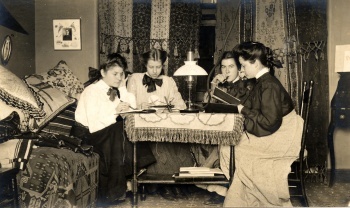
"Studying around a Welsbach gas burner in Main building, circa 1905," image via Vassar Encyclopedia <http://vcencyclopedia.vassar.edu/buildings-grounds/technology/electricity.html>
Welsbach ウェルズバハというのは発明者であるオーストリアの化学者 Freiherr von Welsbach (1858-1929) の名をとったバーナー(あるいはマントル)の商標名です。酸化トリウムと酸化セリウムの混合物を付着させたマントルを過熱して白熱光を得られるようにしたのだそうです。
このページを読むと、1870年代くらいまでは、学生の部屋には2フィートのガス燈が入っていて、勉強は8フィートの明るいガス燈のあるパーラーで行なうことが期待されていたのですけれど、実際は学生の多くは個室での勉強を好み、自室のガスの出をよくしようとバーナーをいじったり、場合によってはパンチをくれたりして、問題となったために4フィートに量を上げた。けれどもなお光量は不足して、視力低下や二酸化炭素中毒など健康の問題や火災の危険など懸念された。1873年には新聞が大学の管理を批判する記事を書きます。
で、記事はその後の19世紀末のことがなにも書かれてなくて、つぎの段落では1911年にとんでいます。1911年から12年にかけてオール電化(というよりガスに加えて電力の導入)が行なわれた、という話です。――
Once Vassar's plan was approved, Lord & Co. began installation early in 1911. By the commencement of the 1911 fall semester, electrical lighting and heating had been effectively installed in Main building. The rest of the campus, including residence halls, academic buildings, and the library followed soon after, as electrical outfitting quickly reached completion by the early months of 1912. Once electrical lighting had become fully installed in the hallways of Main, students were provided with a gooseneck lamp in addition to the gas lamp, allowing them to arrange the light in almost any position. The gooseneck lamp also allowed for a sleepy roommate to rest as working students could direct the light to the corner of the room, effectively illuminating one side of the room and leaving the other in relative darkness. Instead of having to cope with the overhead flickering of the gas lamp, students began to prize the convenience and utility of electric light in their dormitory rooms [. . .].
この電気導入は、先月「ガス・プラント Gas Plant」で書きました。建学当初からキャンパス内に設計されて、アメリカ初の大規模セントラル・ヒーティング施設として建物に暖房と照明用の熱とガスを供給していたガス・プラントでしたが、逆にそれゆえにアメリカの他大学等に遅れたかというとそうでもなくてだいたい同時期のようですけれど、さらに自家発電というかたちで電気をキャンパスに入れたのでした。
上の引用には、1911年の秋学期が始まるまでには(commencement はここでは「卒業式」の意味ではなくて「開始」の意味だと思われます。confusing です)メイン・ビルディングには電気が入り、ついで学生寮や図書館など1912年の春には電化が完成したと書かれています。そこで学生たちはこれまでのガスランプに加えて "gooseneck lamp" (日本でアームライトとかフレーキスタンドとか言われるもの) を与えられ、ルームメートの迷惑にならないように角度を変えることもできるし、暗いガス燈をいじる必要もなくなって、明るい電気照明を享受したのでした。
こうして、実質的に初代学長(1864-78) だったジョン・レイモンドが、学生がバーナーのガス量を増やそうといじったりなぐったりして細工するさまを “licht, mehr licht” (光を、もっと光を)と(ゲーテの臨終のことばとされているものでしたっけ)揶揄した時代から40数年を経てようやくもっと光が与えられたのでした。
エーと。何の話でしたっけ。就寝・消灯時間の規則については調べておりません。1912年というのは『あしながおじさん』が出版された年です。この作品は単行本になるまえに雑誌に連載されていたのですけれど、母校の電化の話はジーン・ウェブスターにも伝わっておったのではないかと思われます。で、あれこれ懐かしんでるのかなあ、というふうにも思われます。
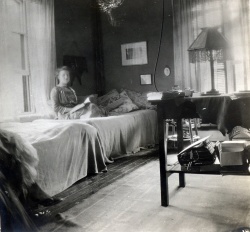
"A student in her newly electrified room in Main Building, circa 1912" image via Vassar Encyclopedia
新たに電化された自分の部屋で本を読む学生、1912年ごろ。




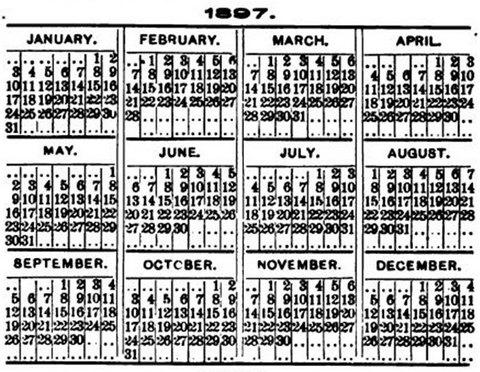
-d8b0c.jpg)
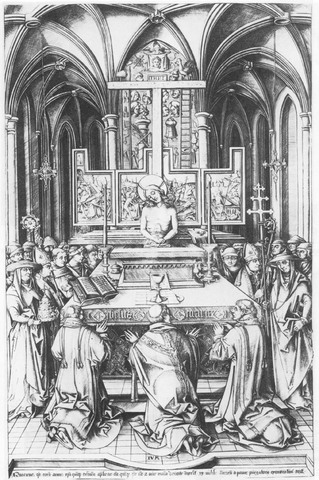

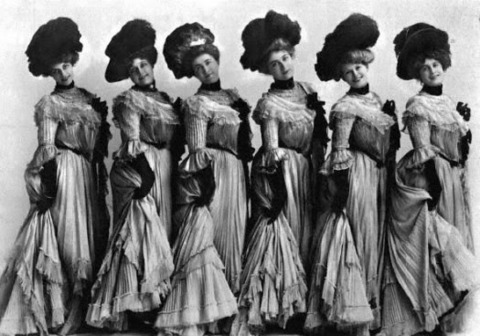
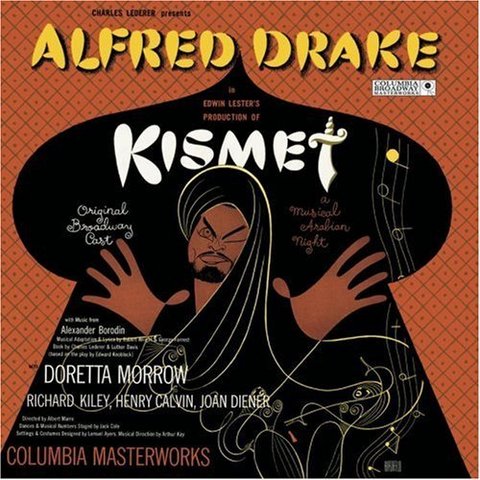
.jpg)
-11436.jpg)
-fe26d.jpg)
.jpg)